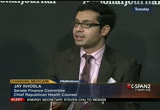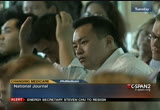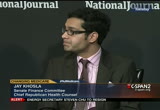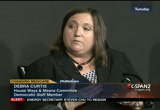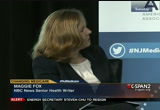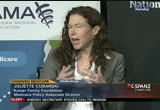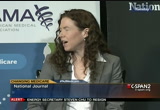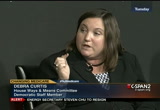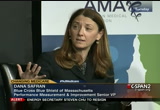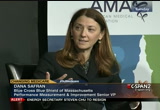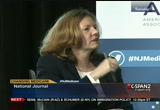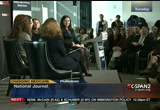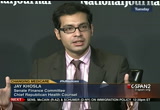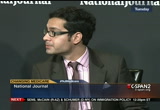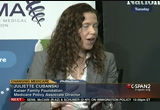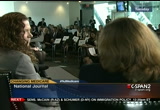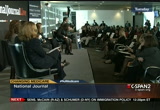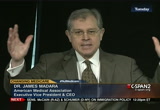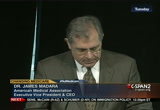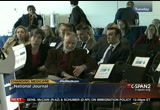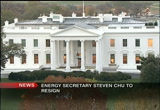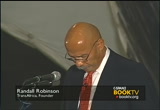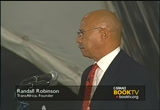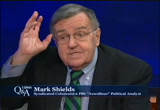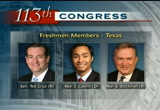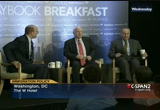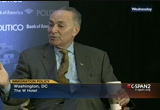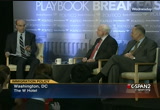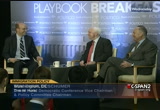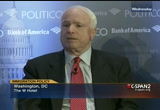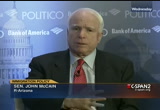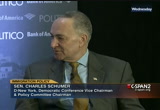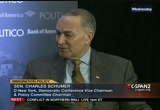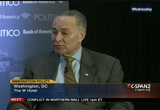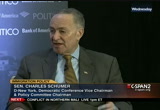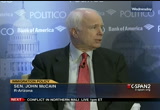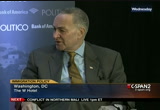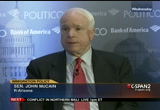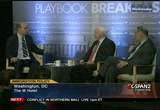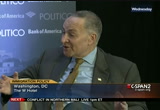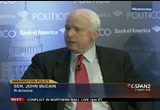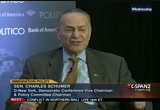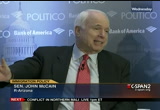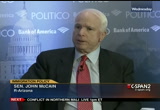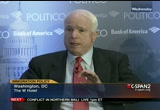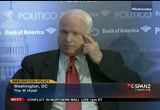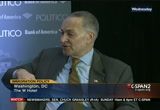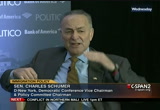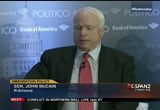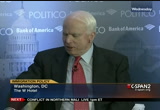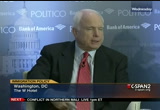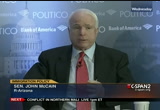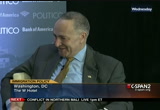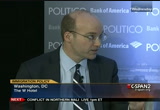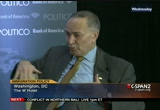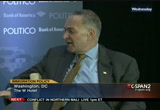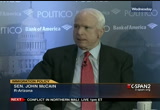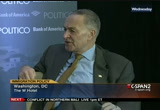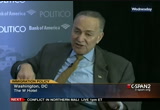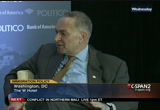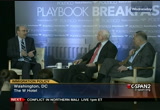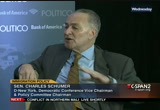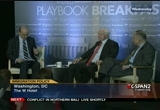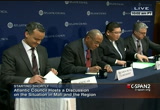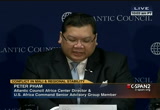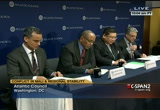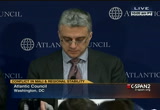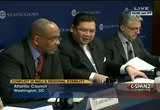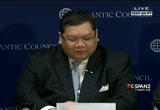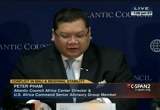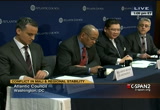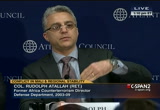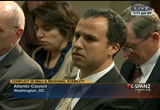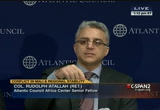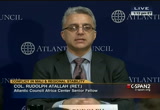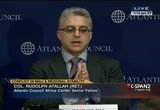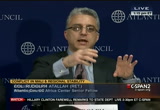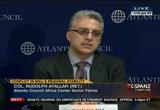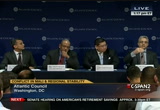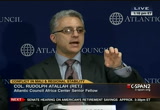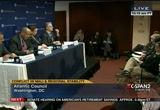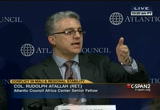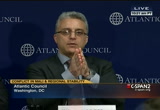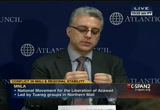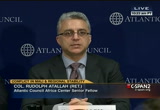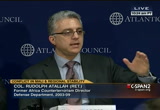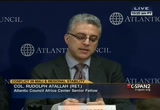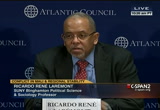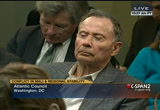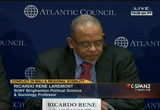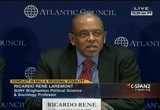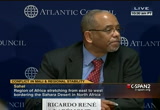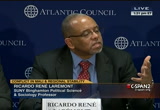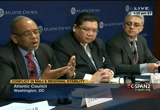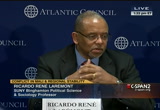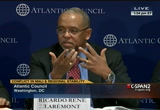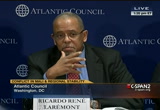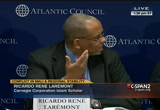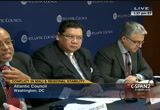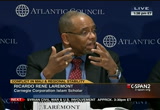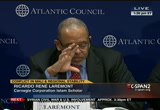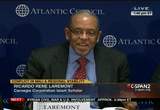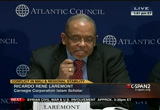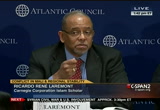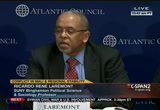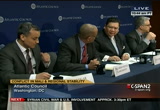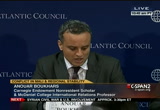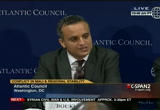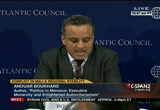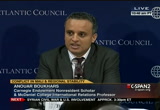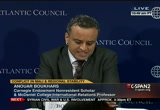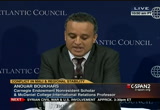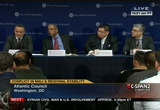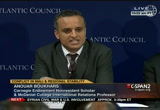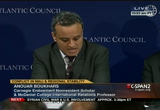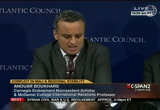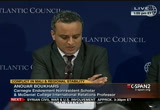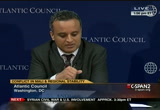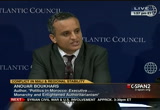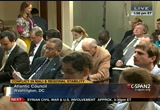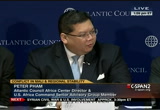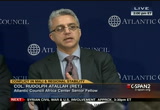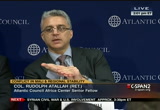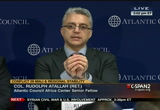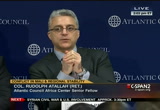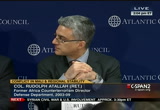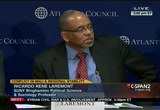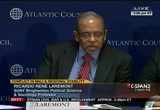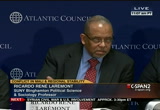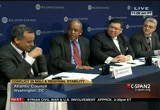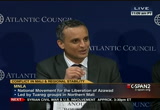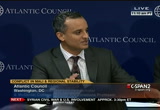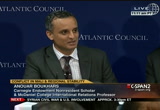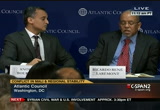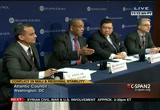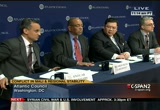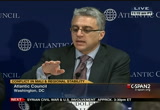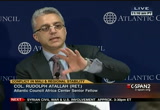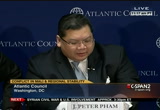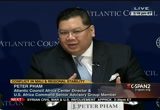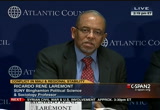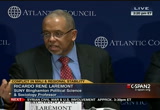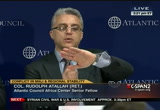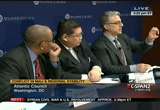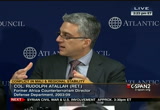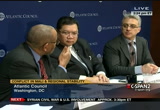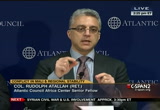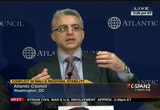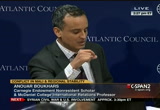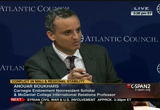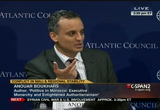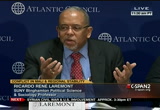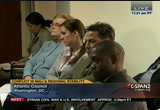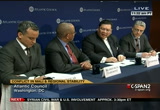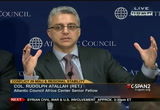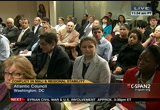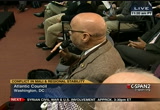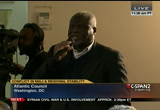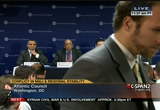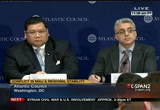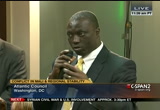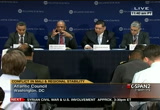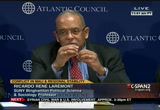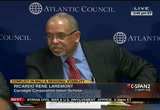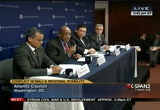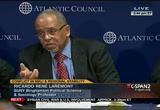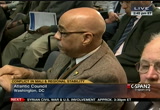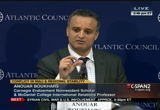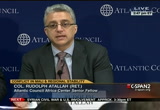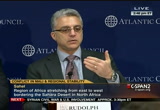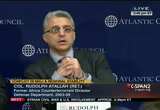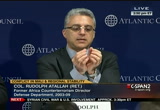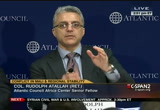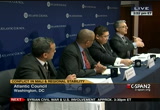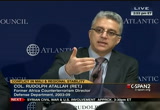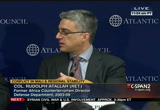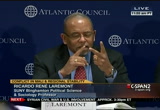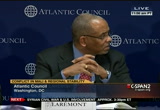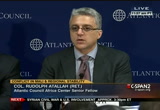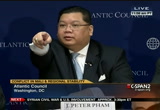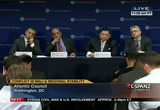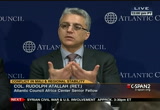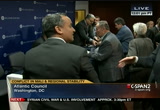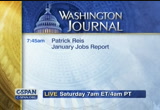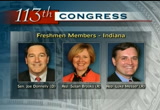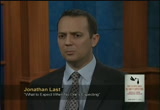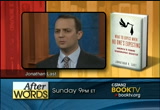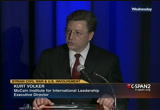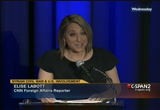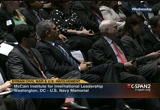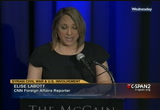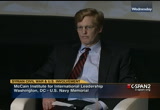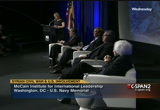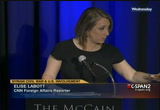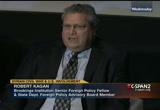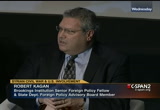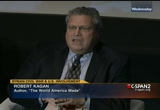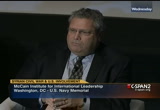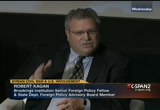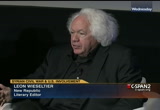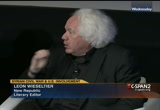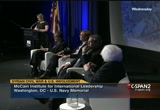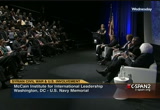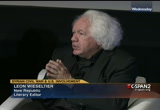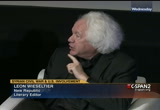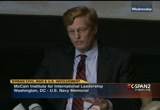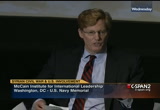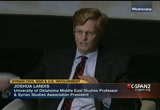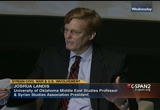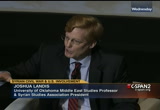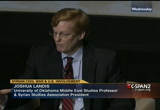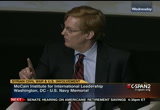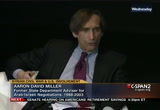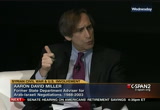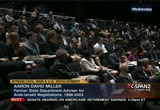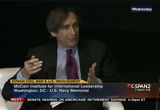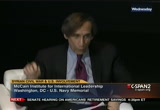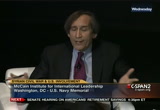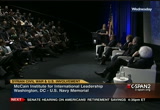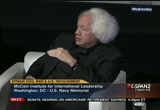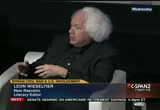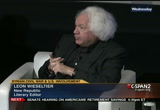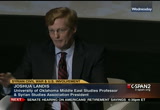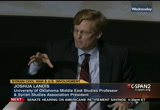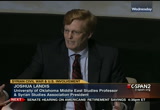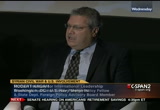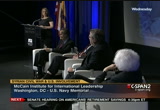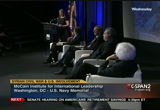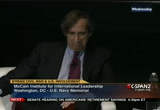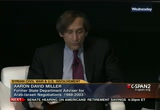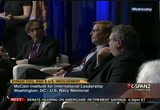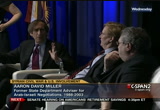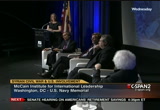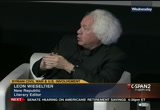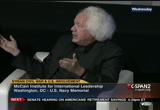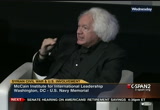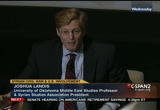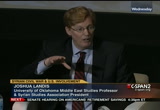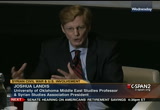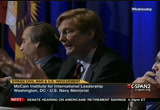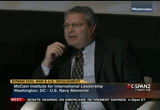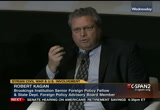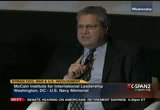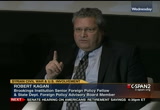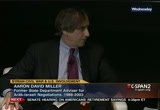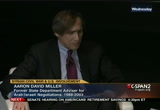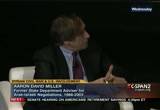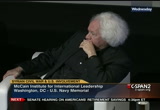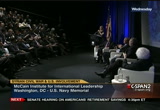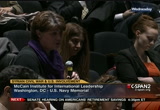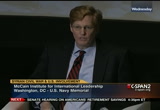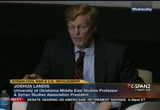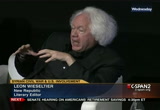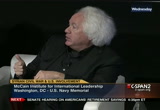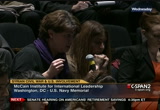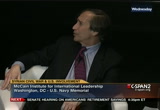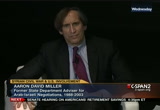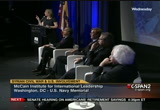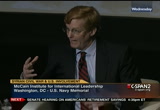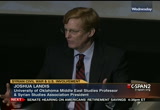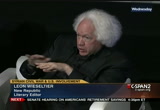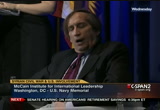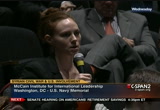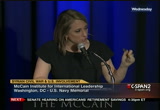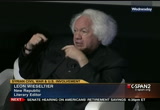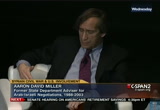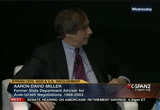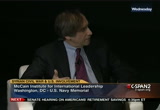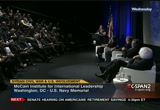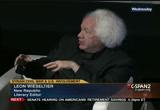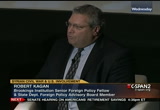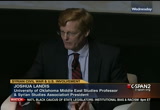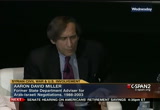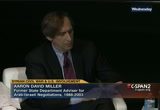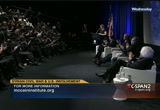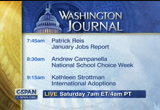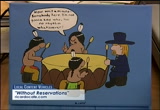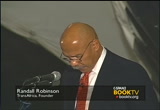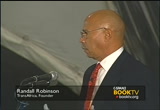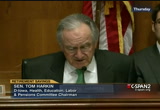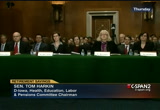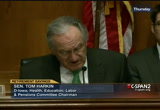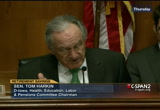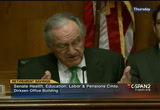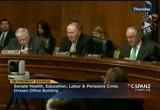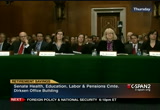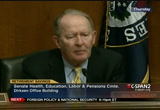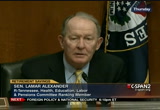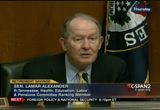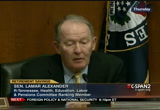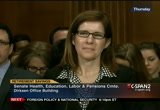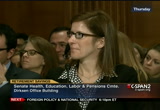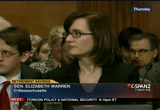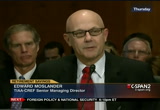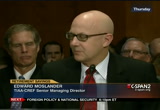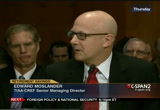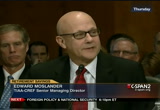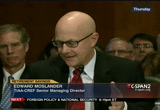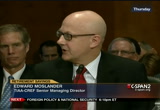tv U.S. Senate CSPAN February 1, 2013 12:00pm-5:00pm EST
12:00 pm
have concerns, but that is a reality we all have to face with. nobody has a perfect answer. nobody has a perfect solution, but that has to be part of the solution that they are working on. we can sit here and splice the data on what's happening with health care expenditures, and you can look at in ag data. >> host: see what's happening again, the past couple of years, health care costs have gone down to look at 2014 and beyond and see what happens to the health care cost. they bounce right back up. so we can either kind of bait and, we have done our job, it's time to move on, or we can just okay, the real challenges lie ahead, we all have our priorities but we have to work together. ..
12:01 pm
that is the way we are going to have a conversation but if the conversation is going to immediately devolve into everything is fine and we need to do it this way, that is no good for either side. i'm not saying this is one party or the other i think this is congress as a whole. we have to figure out how to move beyond the talking points and say decisions have to be made. >> a lot of people agree politics is a barrier. is there a way to fly under their radar in politics? >> first of all sure medicare is
12:02 pm
no more a lightning rod than death panel. everybody is guilty here. my former boss would say if he were here it's been the past decade we have seen medicare become a political football that it is and it's because the strong ideological belief the government is bad and a number of people have gotten elected to congress who ran on that platform and continue to serve in a manner of opposing the government and devotee is medicare is a government program. it doesn't exist because the government wanted to run an insurance company, it exists because the private sector wasn't taking care of senior citizens and there was an agreement to have medicare stepped in and create this program. when he was the chair and ranking there wasn't a medicare bill -- and this was 15 years ago -- that went to the floor of the house both of them didn't
12:03 pm
support. so we should be able -- while i agree the recent past isn't a good example if you go back further in the past there was a lot of consensus on the medicare program. when we created the system that was to start working with gail wilensky and the ama to pay prospectively for the physicians' services. we do have to get out of the political name-calling but it takes both sides to do that and if someone has a clue how to do it, we all love to know. >> getting a little bit away from the politics there are also policy disagreements. we arnaud all kumbaya on everything and you mentioned one thing which is raising the medicare eligibility age. why does everyone agree that would necessarily save money? can you address that? >> sure. raising the medicare eligibility to 69 has been around for a long time. it's gotten quite a bit more
12:04 pm
attention in the past couple of years. one of the major concerns with the idea prior year to the passage of the affordable care act as you would create a large number of people who would be without insurance if they didn't have medicare coverage when they reached age 65. the affordable care act creates new opportunities for coverage through the state based insurance exchange with expansion of medicaid and subsidies for people with low-income which would be beneficial to people if they want eligibility for medicare. but i think a concern with this proposal is you can definitely save medicare some money by removing people from the medicare rolls for a couple or three years the. but that doesn't really do anything to address the problem that we have in this country with the growth and health care cost overall. it is a mechanism basically for of shifting costs from the government to the private
12:05 pm
payers, employers, state governments in the medicare program and the beneficiaries themselves to people who lose access to medicare many of whom would end up paying more for the new source of coverage than they what under the medicare program, so it's one of those idea that will get a score from the cbo and make the cost cutters happy in that regard. it doesn't really address the more systemic cost problem that we are having in this country, and while there might be opportunity for coverage for people who lost their medicare eligibility many of them according to the analysis the foundation has conducted what end up paying more under their new source of coverage so it isn't quite when when policy options and that many might think it is. >> i would also add it's very difficult when you look at each
12:06 pm
of these in isolation because we are not talking about passing one policy. if you take the regulated medicare and then you say let's increase the means testing i think one of the problems we have today is people don't understand how much of the testing exists in the program. if you earn $80,000 a year in the medicare program you are considered rich and pay an increased premium. for under 65 you have you're i think 400,000 before you get an increase in taxes. it doesn't make sense. medicare isn't a cheap program and we all forget this when you going to medicare you pay two sets of premiums if you are a couple and of the medigap coverage and part d coverage to read your monthly expenses escalate dramatically at a time when you have probably fixed income and less opportunity to increase that income in the future. so i think that we have to be very careful when we look at the
12:07 pm
beneficiary impact of changes and we need to really understand what we are talking about and what is going to impact people. the cost sharing in the core is very high so to increase his cost some people is a difficult thing to do. it plays into what they're raising the age goes together so why worry if we look at them in isolation you can miss some of the problems that happen. >> i can't help but draw the parallel to the commercial side where we have had for years efforts to try to get health care spending under control by dealing with the benefit side, inventing new benefit structures in the high deductible plans and other things the would make individuals more price sensitive and increase their cost share and so forth in on the other hand, now on the supplier side for the payment reform there's
12:08 pm
very little question in my mind and i'm no economist with the congress that is evaluating what we are doing in the payment reform have been very low in their mind that we get so much further in the affordability goals and the quality improvement goals by addressing the supply side and we hope to accomplish using putting more and more on the backs of individuals. we've heard story after story this morning where there is irrational use in the delivery system because of the fragmentation that we have and we have seen through the payment reform that we have done that setting the right payment incentives in place actually does help rationalize the system and start to net the fabric together between the primary care and specialty care and we actually have hospitals that start to understand what their
12:09 pm
place in the reform system is there a cost center not a revenue center and they have to actually become smaller over time for the system to become sustainable, so to me, you know, to focus our attention on the individuals in the public and beneficiaries and how we are right to change their benefits to make all of this work seems like a full of air and when the real problem is the way that we have structured the incentive on the delivery system side and fixing that we can get a long range towards addressing affordability and quality. >> we have time for a question or two from the audience. if you can identify yourself there is one of over here and i think len wants to ask a question as well. >> i am land nicholson, i was impressed with the letter to the colleagues of 100 of them.
12:10 pm
two questions, first very short did anybody come to chat and second, what comparable gesture might your boss see as well coming from the other side? what else do we need to keep this conversation going? >> thank you, len, very nice question. i think it has been a busy week in the senate so we are hoping our colleagues on the other side of the ogle will reach out over the next couple of weeks. he has had some very good chats with his fellow colleagues on the other side of the on the floor that he has come back with. so far nobody has come in which is a good start to the conversation. but on the other side of the aisle, it is i think what we are really hoping for is a good conversation because at the end of the day as everybody on this panel talked about, this is a
12:11 pm
very complicated issue which means a multifaceted answer and there is a reason that we have put out this option that goes from the cost sharing to the fundamental transformation of medicare. it has to be a place where everybody has schaenman the game that includes the beneficiaries and the insurers and providers. and you know it's easier on the policies to say age or you can go back to the medigap reform and point out the winners and losers, that you have to look at this holistically otherwise at the end of the day here is the simple and honest truth. if we don't stop looking at entitlement reform in a comprehensive manner as part of an overall discussion, the only thing we are looking at is congress than is cutting providers and i think providers are kind of them with those, and i honestly think the congress is done with that and my boss is
12:12 pm
done with that and he wants a fundamental transformation of the program to get away from this year by year exercise where we are struggling to find the low hanging dollars for the providers and the the market kutz and move on to a spot where we see okay there are 10,000 seniors joining the medicare program every day. the program is unsustainable and people can put whatever they want on it and look at it a certain way that we are on a path to insolvency on medicare. so let's try to figure out a path where the beneficiaries are involved, providers are involved and insurers are involved so that is all they are looking for is a holistic conversation and we welcome anybody out there that wants to have a conversation with our office. thank you. >> do we have time for one more question? >> right here. >> a quick one for juliette. you talk about some of the
12:13 pm
changes that would occur with luring the age of medicare. none of the things is how we bring 65, 66-year-olds into the regular system to drive up the cost and with the 321 range banding could that cause people that are younger to drop out? one of the things gail wilensky pointed out as a positive thing is bringing everybody into the system. could that undermine getting those people in and held that would affect the positive move towards the new universal coverage? >> we did an analysis of this and we did show there would be a premium effect for people under age 65 in the insurance exchanges bringing the relatively higher cost 65 to 66-year-olds into the relatively lower cost insurance exchange pool to increase premiums by a modest amount. i think it was 3% overall according to our analysis.
12:14 pm
in 2014 if you implemented the eligibility age to 67 in that year. we didn't do any further analysis of whether there would be dropouts. there is a potential for that but it's questionable whether the 3% higher premium would move the needle very far in that regard. but it would have those kind of affect and also increase the premium for people to stay on medicare because just as your taking the 65 and the 66-year-olds out of the pool, you are leaving a relatively more expensive beneficiary behind, people 67 and older. so there's that premium affect all around. >> that takes us to the end of the session. i would like to thank the panelists that have appeared, thank you so much. you have each brought some very
12:15 pm
important perspectives to the conversation. i will turn it back over to connie. [applause] >> thank you so much. once again, i would like to think the american medical association and welcome the executive vice president and cea to offer some closing remarks to us. >> this has been fantastic and i would like to think the national journal for acting as the host and the speakers, they were wonderful panels. the audience, the great questions. maggie coming you served as the bonding agent for the whole thing. so thank you. a couple of comments. why is health care such a special topic? this really brings it home and i can think of three reasons.
12:16 pm
first, obviously it is too expensive for the outcomes that we secure with 17, 18% of the gdp. second it's awfully personal. as i like to say to the groups like this, we are all pre-op it is just a matter of timing. third, it's national. our security as a nation rests in the quality of the physiological capital of our citizens. so, where are we in this discussion as we think of panelists that represented different disciplines and different points of view? there seem to be several and i will name the three points of agreement. one is the status quo is unacceptable. we can sort of see the blurring of vision of the future and the question is how the transition. what is our plan for transition into that future.
12:17 pm
second, we are a diverse nation of what works in manhattan, kansas is unlikely to be the solution for manhattan new york and the need for the physician leadership that's not the least of all because physicians are the trusted agents. much has been said about motivation. i think of the work that showed what is motivating and provides satisfaction for physicians as a primary driver of that is feeling as though he or she has delivered quality care to the patient and has been relieved of the administrative burden of doing that and actually spent time with their patients. where are we as a ama in our positioning? as i mentioned, we have worked with a variety of other stockholders. a transitional framework of which will be available to
12:18 pm
anyone who would like to have them we see the role in the transitional phase to this future. in the quality care one of our endeavors and the second one, we are focused on educating physicians in a way that will allow them to participate in this future that is more team based and quite different than the medicine of the past. if there, thinking of the physician sustainability and practice so that physicians can do what they love to do and that is take care of the patient. let me say as a recovering dean and hospital system ceo and now ceo of the ama i have learned to
12:19 pm
always try to jump in and of adjudicator early conflicts before the blood. so, with grace, len, tom and alladi in our view there is more to become nothing more eloquent than the high road and care. thank you. [applause] >> some news out of washington energy secretary of state chu announced he will resign once his successor is confirmed in a memo to colleagues received by politico. the former prisoners of he's eager to return to california and academic life. the white house released a statement by the press in which he said steve brought to the energy department a unique understanding of both the urgent challenge presented by climate change and the tremendous opportunity that clean energy represents for our economy. the statement went on to say i'm
12:20 pm
grateful that he joined to my cabinet and i wish him all of the best in his future endeavors. a quick reminder we have live coverage coming up here on c-span2. and about 40 minutes we will have a discussion on the conflict in northern mali ouis many years ago louis brandeisott wrote that the most important office in a democracy is the office of citizen. a democracy of course is rootedf and based in the notion of ansos
12:21 pm
enlightened citizenry to read some of us think that democracy is defined by the ritual votings of course in voting it is dem important inoc a democracy. voting takes place all over then world. it takes place in democracies.n it takes place in dictatorships. it takes place in a totalitarian societies. voting alone doesn't mean we live in a free society. fre we live in a free society when it is based on an enlightened citizenry that takes thatghtenmo enlightenment into action causing vose to honor our ideas as a nation.
12:22 pm
john mccain's 2000 campaign when he ran for president is the most memorable campaign of any that i've ever covered or banaa around. i mean, it was just we will never see it again and the hearing was facing george w. bush who headed the republican party backing him and the republican governors in new hampshire and all the money and john mccain held 114 town meetings. he stayed there until every question was answered. you see the light of all going on people's head when are we going to get the people's rights and he's a we are not going to get the people's vote of right if it isn't funded by insurance
12:23 pm
companies and next question. refreshing candor to people's responses and then he was totally open to the press. there's a candle in the open as and a sort of welcome mess that no one had seen before and no one certainly have seen since. both houses of congress are back next weekend with the 113th congress now under way we are taking a quick look at a few of the new members from texas. republican senator ted cruz replaced kinealy hutcheson. a former texas solicitor general and served as a law clerk to the late supreme court chief justice william rehnquist to be on the house side democrat castro as representing texas 20 a district the first term congressman is
12:24 pm
the medical twin brother of san antonio mayor who gave the keynote address at last fall's democratic national convention. and republican steve stockman serving his second stand in congress having previously representing the state for one term in the 1990's to meet on wednesday senator chuck schumer and senator john mccain revealed additional details about a bipartisan framework release on monday to address the nation's immigration issues and what might kill the deal. the future speakers of the political playbook practice hosted by chief white house correspondent mike allen. this is just under 40 minutes. [applause] >> senator schumer -- >> made in brooklyn the 1200. it's good for you.
12:25 pm
[laughter] so, senator schumer, congratulations on tough sandy aid package. it is one of your biggest accomplishments. >> thank you. it's very important. there are so many people in new york just waiting for that. i was in island park. that is the home community and he came out 60% of the stores on main street are still not open to read half of the homes cannot be occupied and no one can repair or rebuild until they know the money is there because the federal reimbursement and no contractor would sign the contract unless they know the money is there and people will be able to get back on with their lives. >> you will be meeting with samore leaders there.
12:26 pm
>> the vice president is going also to the annual conference is attended leaders all of the world i remember a couple of years ago vladimir putin came and insulted the united states and every other nation in the interesting diatribe. what is your via of the president? >> i don't think that she was as happy after the 60 minutes peace. [laughter] >> why is that? [laughter] >> i think that he's one of the most likable man that i've ever known in the united states senate. i think that chuck would agree. >> before we come back you are saying to accomplish something rare that is for democrats and republicans coming together on something that served 13 years as senator schumer came to the other body in 99 and the gang of
12:27 pm
eight started to come together the friday after the election senator lindsey graham gave you a call saturday morning use all the sheep and you said what? >> i said hi lindsey and he said that he's one of the most effervescent. and he said the band is back. let's do immigration. and that was wonderful. the next moment he said i've talked to john mccain and he wants to get back involved because that meant that we could get something done and we had done different tv shows on the sunday morning talk shows a good location for both of us and we both said that we were going to do it and here we are. we are not there yet but at least we have made some good progress.
12:28 pm
>> senator, you jump back and forth. you changed. what made you decide to join the ban? >> i have always been for it, but i've always been concerned about border security, and i think that with good reason to the if you talk to the experts that say the drugs are smuggled into the united states and come from of mexico border there's a huge of violence as we know in mexico which has gone up to read we have people on the mountain tops joining these coyotes to bring people across and mistreat them in the most terrible fashion. the horrible things happen to people that are brought across and we need a secure border and we are going to go to the border, but again, we have made significant improvements, and there have also been technology advancements in places like iraq and afghanistan where we can survey of the borders. my friends on the arizona
12:29 pm
mexican border it gets as hot as 140 degrees and that is hard on people. as we have to do the technology side of testing what by the way they've been able to do and i am confident that we can make that progress to ensure our citizens that their lives are secure. we are in a secure building. every night to have drug people going across the property. they deserve security. but we can achieve that. we can achieve that and we are on the way to doing that. >> you said about six of the members are going to go with you. what can you see when you go to the border? >> first of all, they can see the fastness of the border to be the second thing they can see is the improvements that have been made. third, they can see the things that need to be done. talk to the men and women on the ground in the border patrol. the ones who are out there every day literally risking their lives to read there's nothing
12:30 pm
like having eyeballs and chuck and i found on the issue to get a good understanding. >> yesterday was the sixth meeting of the gang. >> yes, but we hate the word gang. [laughter] >> group. >> come on. let's leave brand it right now. what would you rather have the name? >> group of eight. group of americans. how about that? [laughter] >> what did you cover at your meeting yesterday and what is the next step? and these meetings were in your office? >> we don't want this to be a democratic proposal or republican proposal we want it to be bipartisan so they alternate between john's office and mind to it last night was in john's. >> do you have the facts? >> nope. i'm going to try to get some kosher food. maybe some salmon or something like that.
12:31 pm
[laughter] >> john said something monday before we announced our details. i said do you think we can get this done by march? she said absolutely. it's so difficult as he has been through and what i've been through right in the details of legislation. last night we started tackling some of the biggest issues, the parameters for measuring when the borders secure and how to deal with the 11 million to gain citizenship given that there are so many and our colleagues want to make sure they are not treated any better across the border illegally than people but we did in line to read we made huge progress and we come to an agreement to the it took about one hour and 15 minutes. and our staff today are meeting with the people on the dhs to go
12:32 pm
over some of the technologies that john mentioned and we have set meetings. so, we are going to meet tuesday and thursday at a set time every week until we get this done with wednesday being the staff meeting to work out what we did on tuesday and fathers day to review with the staff has come up with as they flush out the legislative details. ..
12:33 pm
john and i worked on a little group that came out with some rules changes in an effort to strengthen that. so we can go back to the way the -- >> in order to prevent the 51-vote meltdown. >> right. and, we, we very much want to see the regular order restored. i have had younger senators come to me, what is the conference committee really like? how do you legislate in committees? and it's, you know, because we don't do it anymore and it makes being a legislator less pleasant and which get less done. so the immigration bill may be the first big test of that. senator leahy in any case agreed we would have all the time we needed. there will be a big markup in committee. the judiciary committee has
12:34 pm
very liberal members, and lots of conservative members. there will be lots of amendments out there. senator reid said when we're ready to go to the floor we will, late spring, early summer. >> will you all stick together to reject amendments in the judiciary committee and on the floor? >> we haven't talked about but i think we have to -- >> you -- >> we have to unless there is something that we both agree to. in other words, if you're going to, this is going to be fragile as to these kinds of things are and so, we will have to take some tough votes in order to keep it intact but, look, that is so far down the road now, mike, we haven't had a chance to discuss it. >> i think one thing we agree on the core principles we must come up with must stay intact. that doesn't mean every single amendment john and i have to agree on and we
12:35 pm
probably won't. >> how much time do you expect it will take on the floor? >> i think it could take three, four weeks. you know, this is such an important issue to america and it is so complicated and deals with every aspect i think we should have a full and robust debate. by the way, the hope is we could pass this with a nice sizable bipartisan majority that will set the stage to make it easier for the house to pass it. we don't have five republicans and wouldn't get all 55 democrats. >> it will be a lot of republicans or, either way. it's -- >> can i say, john and marco rubio and lindsey have shown such courage on this and such strength to do what is for the good for the nation, you know, it really, i have been really impressed with their desire to meet us in the middle. same with bob menendez, dick durbin on the other side. and but particularly our
12:36 pm
republican colleagues. they're getting a lot of flak and they're showing strength that is another thing that gives me optimism, anyway. >> there is a trace of mass sew kism in all three of our families [laughter] >> senator mccain, how hazardous, marco rubio, possibly running in 16 to be taking point on this. >> i think it is important and i think it is helpful. marco rubio represents a very large state with a lot of hispanic and latino voters. he understands the issue. he is articulate and, i think that it's very helpful to to have a newer member of the senate that is of his, frankly, really deep understanding of the issue and appreciation of it. as you know his family came from cuba and he understands, i think, the issues
12:37 pm
confronting people who came to this country either legally or illegally as well as anyone. and i would like to say a word about chuck. he is really been very strong. we have, he has people on his side of the aisle that just want everybody citizen now, end of story. and we've had to, he has had to push back against that as well. we've got to maintain the center. there will be people at both ends that will not ever agree. we have to understand that. we're not seeking 100 votes. but we're seeking 80 votes. i think we can achieve that. >> senator schumer, 80, is that the neighborhood you're hoping for? >> that's the hope but getting a large majority on each side is very important. >> senator mccain, you said what senator rubio is doing is helpful to the senate. is it helpful to him? >> i think so. i think so. but you know the thing i found out. >> how would that be? >> well, he took leadership role on a very important
12:38 pm
issue. you know what i think i've found in my political life is, if you do the right thing, it's always ends up okay. if you do something for political reasons in my experience, and i've done that. it's turned out badly. so i think that marco rubio is doing the right thing. >> i'd add, and i agree with john completely on all of this, he has been daniel in the lion's den. after we came out with our principles he signed to go up to all the talk shows of the very conservative radio and tv hosts and it was amazing. he started out with the rush limbaugh show. i think rush limbaugh has been more hostile to immigration reform. >> talked a little bit yesterday -- >> on the show. rubio, daniel in the lion's den, when the show started, limbaugh was far more hostile then at the end. that will be a real service
12:39 pm
because there is -- >> what he has been able to do and what we're trying to do is make the, our talk show friends and people on the right at fox and other, that the status quo is unacceptable. the status quo is unacceptable to have 11 million people in the shadows forever in this country. and we have to keep assuring them, this is where i appreciate chuck's cooperations, cooperation and dick durbin and bob menendez, we have to show a secure border. look, it's a fact. in 1986 we gave amnesty to three million people and said we would secure border and it would never happen again. now we have 11 million people in this country illegally. i doesn't want to hand down to the next generation of leaders where we have a large group of people that came to this country illegally. chuck understands that. that goes a long way in assuaging the concerns of a lot of my friends on the right. >> one more question. >> i would just say one
12:40 pm
other thing. we, dick, and bob and i on sunday before our prince ills -- principles came out got on the phone with the hispanic leadership. i think they understand it. i can just speak on the liberal side. i have been impressed with the understanding of the groups who so yearn to help their brethren, brothers and sisters, brethren i guess is no longer politically correct word unless there is a female analogy. i don't know if there is. brethren and -- >> sistern. >> i didn't want to say that and get criticized. the sisterhood and brotherhood. anyway, we digress. they yearn for them to come out of the shadows. they have an understanding that just to have a wish-list and say, here's what we believe in and not be able to compromise will consign the problem to go on. the desire of not just us
12:41 pm
but the groups out there to understand compromise is a necessary part of getting something done has impressed me. >> there is one other dirty little secret here. 72% of the hispanic american vote went to the president of the united states in the last election. republicans are beginning to appreciate if we're going to have a meaningful dialogue with our hispanic citizens and latino voters that we're going to have to resolve this issue. it is just a fact. >> what specifically did governor romney do wrong on this issue? >> you know, one of the things that i enjoyed after i lost was the unended and unceasing barrage of criticism and second-guessing. a lot of it by mike allen. so [laughter] so i don't -- no. i think the republican party, not, not mitt romney, not anybody else, but the
12:42 pm
republican party has failed to understand to a significant degree the importance of this issue to our hispanic voter. i'm talking about pure politics now, pure politics and that is that, we are elected to office because the voters think we will help them achieve their hopes and dreams and aspirations for the future. if you have a large block of americans who believe that you are trying to keep their brethren and sisterhood, down, their fellow hispanics down and deprive them of an opportunity, obviously that is going to have an effect on their voters. so, i think the republicans, we're not all monolithic but we have not been more sensitive to these hopes and dreams and aspirations, and it has been reflected in the ballot box. >> last question on politics and then we'll plunge into the specifics of the bill. senator mccain, there's republicans in the house and senate have threatened to
12:43 pm
derail this bill. senator cruz, freshman senator from texas came out against it yesterday. how damaging will it be to the republican party in that occurs? >> senator schumer and i are presenting maybe too rosy a picture here today. this will be a tough slog. this will be a tough, tough fight but american public opinion has shifted dramatically since 2007. poll after poll shows that the majority of the american people, i mean, significant majority of the american people believe that there should be a path to citizenship as long as they pay a fine, back taxes, all those things. >> why will it be so tough? >> the things that are necessary in order to achieve citizenship including being behind those who came to this country legally. that caveat is a huge caveat. it changes those numbers rather dramatically. that's why we're focusing on this part of this issue as well. so, whoever is opposed to it is now looking at public opinion polls that are very different, in my view, that
12:44 pm
on they were in 2007. >> senator mccain, if this goes down what will be the consequences for the republican party? >> i think there will be, the trend will continue of lack of support from hispanic voters, and also, as you look at the demographics of states like mine, that means that we will go from republican to democrat over time. but there's a lot of issues that our citizens care about besides immigration and that are important to them that they will be making their judgements on. but until we get that issue resolved, they will not be able to debate those. >> senator schumer, you're saying if this goes down republicans will do even worse with hispanics? >> i'm not in the business, you know, yogi berra said, never try to predict especially when you're talking about the future. but i think that --. >> clearly you think that would be a danger? >> i think it's, i think it's a danger but, mike, i
12:45 pm
think the reason why we're doing it because we see this issue out there unresolved. it's not so much concern about the future. it's concern about now. >> yeah, i was just going to say on our side, there are some, i've heard the argument, let's keep it out there as an issue. let's leave it as a wedge issue because it will assure the dominance of the democratic party for a long time. that's wrong. that is just as wrong the people who say, don't do anything. and i think the vast majority of democrats, the president included, want to get something done here. >> senator schumer, you referred to this in your remarks in the press conference the other day. i think there are a lot of people wonder does the president really want this? why are you convinced he wants the achievement more than the issue? >> i talked to him about this issue several times face-to-face. he really does. he cares about it. he necessary how important it is for the economy of this country, which has been his number one guiding issue
12:46 pm
to solve our immigration problem, in a lot of ways, not just having the 11 people, 11 million people come out of the shadows, pay taxes, become productive citizens, but in terms of future flow, we all agree, its absurd we attract the best and the brightest around the world. let them get ph.ds, mas, bas, from our best universities and say you have to go home, go home and compete against us. it makes no sense the president understands that let me tell you he has been terrific on this the idea that we were jockeying is not true. dick durbin and i spoke to him sunday night. we told him we had come to an agreement and we had a great conversation. he has been extremely positive, and what he has done and i think he is playing a constructive role here he i am pour tuning us and rallying the country to get us all together. but at the same time he is giving us the space to get something done and i've been
12:47 pm
very impressed with not only the president's desire to get it done but his ability to work with us as part of a team to get that done as leader of the team, which he is, but to get it done. >> every president in their second term worries about their legacy. i think the president is more interested having this accomplished than he is harming the republican party. >> senator mccain, have you talked to president obama about this issue? >> i have not. >> what are the state of relations these days? >> i, i have great respect for the president. i hope and i believe that at some point we will all be meeting with the president on this issue because we need to coordinate with the administration. but, i think, i haven't seen a degree of partisanship overall as there is today but we are showing some signs of bipartisanship.
12:48 pm
this thing we just did in averting the nuclear option in the senate, this issue, i think that republicans are more inclined to let the process go forward and senator reid is more, more inclined to let us have amendments. i see, i think that when we are down to 11% approval rating, there was a favorability thing, different things are favorable. a colonostomy is viewed more favorably than a member of congress. we're kind of in bad shape to say the least. i won't view that line any further. i got up in line, anybody said in the airport anybody say you look a lot like senator john mccain. i said yeah. doesn't it sometimes make you mad as hell? [laughter] so, there is a desire on our part, i think on both sides of the aisle, to work more
12:49 pm
with the president, work more with each other. maybe that is a little pollyannish. >> i agree. i think the, american politics works in pendulum swings and i think the partisanship has reached its peak. towards the end of last year we -- >> you think not just on this issue, you think in general? >> i think, the number one reason i'm so invested in this issue is to get it done but number two, john and i have talked about this as we went through the rules changes and stuff, is to set a new way of doing things a little bit in the senate, in the congress and in washington, of coming together on the issues where we can come together. and i think it can happen. i really do. >> last december we did the defense authorization bill. we dispensed with 380 amendments and we went forward and we did the right thing. i am, guardedly optimistic we will do, we -- >> we did that bill and postal reform toward the end of last year. it was little-noticed but
12:50 pm
there were a number of important and complicated pieces of legislation, that didn't pass the house, most of them. the defense did, that got through the senate with good bipartisan support. >> senator mccain do you buy the pendulum idea that it reached its nadir, right at the bottom and reached its worst point and is getting better? >> i do. i do. maybe i'm wrong. maybe that's not the case. but i think as chuck just mentioned we've sown we can make certain progress in other areas and i think historians who study the senate, as boring as this might be, will look back on this aversion of this nuclear option because, if it had happened and it was going to happen unless we had come up with this road map for the leaders, maybe that is sound a little egotistical, but it's true on the filibuster. if the senate had gone to a 51-vote body it would have changed the nature of the united states senate forever. >> before we leave the
12:51 pm
president, senator schumer, you had a little quality time for the president recently. one of the many hats you wear you're the chairman of the joint inaugural committee. among your chairman as joint inaugural committee are to? >> ride in the limo with the president alone. it is a very nice limo. in any case, you know, we had a very good conversation. in fact it was not different, than the one we had here about what the next four years are going to be like. and i think, you know, i don't want to give away the president's thoughts but i expressed the same thing that we expressed here, that it will get better. there will be more agreement. and the president i think agreed with that. >> what is the car like? >> plush. [laughter] big. heavy. and the windows are very thick but you can see out of them. they can't see in but you can see out. >> what else did you talk about? >> that was the main thing. the main thing was that. i didn't want to, my staff gave me a list of 22 things
12:52 pm
we needed in new york and i was dying to ask him -- >> only 11. >> yeah, right. on the morning of his inauguration i figured that was not quite appropriate. so a rare moment of restraint. >> humor he is very shy. >> rare moment, rare moment of restraint. >> okay. let's plunge in. on monday you put out the five-page bipartisan, bipartisan framework and the "politico" we like to read between the lines. in the bipartisan agreement it talked about nonforgeable electronic means of employment verification that is code for a super social security card that would have some sort of biometric thing like a fingerprint in it. senator schumer, you said you were for this. senator mccain, what is your view of requiring that? >> i'm for this. i would like to remind you 9/11 commission made a series of recommendations. one of three that was never implemented was this kind of identification that's
12:53 pm
required. now exactly how you, what you call it and how you get to it but there is technology now that could give us a social security card, people with social security card a card that is tamper-proof i think that -- >> you're for that. >> but let's be clear here. people say national i.d. card. that is card you would have to show whenever anyone, a police officer, anyone came up to you. this would only be used, in the same cases when you use a social security card. now, it just couldn't be forged. if we want to stop future flows, john is so right. i wanted to make a point here. our goal is not to have to come back to this 10-year from now. we want a permanent solution. and that means stopping future waves of illegal immigration. a lot of that is the border and that's why that's important. but other parts of it are something marco rubio has pushed. exit entry system. in other words we have a biometric -- >> because 40% of the people who are here i will really overstayed their visas.
12:54 pm
>> correct. they didn't cross the border. >> you have a biometric when you come into the country, but not when you leave. we have to fix that. second, having employers. why do illegal immigrants come here? it is simple. it is for jobs. if you're making a buck a week in a province in southern mexico and you can make $3 an hour here, reason though it is below minimum wage, lousy conditions you're coming. so we want to make sure that employers do not hire people who are here illegally. the only way to do that, is to have a nonforgeable card. right now you can go down the street here and get a social security card or a driver's license for 100 bucks that is forged. >> sound like when you have the legislative language this biometric security card may be in there specifically? >> it may be though i don't think anyone in our group, some on our side may not be there. some say do e-verify permanently. that has too many false-negatives and false-positives in my judgment. we'll have to come up with
12:55 pm
something but the principle we we all agree on. >> someone who hires someone illegally in this country, if they don't know whether they're illegal or not that is one thing. we have to make sure, if someone hires someone that is in this country illegally that they will be punished. >> senator mccain, the white house wants the protection in their bill extended to same-sex couples. would you oppose adding that to the senate plan? >> i think it is a red herring. i think that do we want them to guaranty a taxpayer-free abortion. i'm telling you now, if you load this up with social issues and things that are controversial, then it will endanger the issue. i was interested, the yesterday, morning, first question was that, look. we are talking about four principles that we've got to act on. >> do you think -- >> look, i'll be glad to talk about it and discuss it, what the ramifications are and all that but if somebody views that as the most important aspect of comprehensive immigration reform, then we have a
12:56 pm
fundamental disagreement. >> let me, i'm a response or of this bill i'm for it, i care about it. we haven't discussed it yet. certainly it will be one of the issues on the table but as john said, we've first got to get our basic structure and framework before we -- >> which is more important, lgbt or border security? i'll tell you what my priorities are. so, again, if you're going to load it up with social issues that is the best way to derail it in my view. >> senator you will schumer, there is question they gave me. how do you respond to critics on left fear that legal immigrants after the probationary legal status could wait endlessly before getting green cards? will you push for a time limit for permanent residency? >> this is real important issue. first i want to say a couple things. there are a whole lot of bugaboos that the commission can block anybody -- people can immediately get a work visa. they're out of the shadows. they can work, stay in the united states if they don't
12:57 pm
have a criminal, charge against, a criminal law against them. we know that. but, we have then said, yes, let's secure the border and make sure some other parameters are met. we're defining those as we speak, before you can get a green card on a path to citizenship. but we agreed on a few things. first, everyone of the 11 million who meets our criteria, learning english, staying clear of the law, working paying a fine, things like that, will be eligible. we have to figure out how to do that, and obviously we, none of us intend for people to wait and interm alably long period of time but there is another principle on the other side. very important for instance, that helped bring marco rubio along and to his he has been talking about it all along. he feels by crossing the border illegally you shouldn't gained a advantage over somebody who has waited in turn. if somebody applied in the, to the mexico city u.s.
12:58 pm
embassy in january of 2007, and someone else crossed the border and is here in january of 2008, we all agree that the person who waited in line in 2007 should be able to get that green card before the person in 2008. we have to figure out how to do that so it's not an interminalably long period of time, that people are old or dead before they become. at the same time we have to make sure that this principle is kept because that helps us pass a bill. one other point i would make. we made two exceptions to that. dick durbin worked very hard on the dream act. we all agreed that should get special priority. >> young people born here as children? >> yeah. second we'll need something special for agriculture because it is a different situation. virtually whether you're in new york dairy country or arizona ranching country you can't get americans to do this kind of work. >> we're about to get the hook. my penultimate question,
12:59 pm
senator mccain, have you talked to speaker boehner about this? >> no but i did hear this statement a couple days ago where he believed comprehensive immigration reform is something that needs to be done. mike, just real quick, the environment has changed since 2007. that's why we are guardedly optimistic. there is a whole bunch of mind out there we have a avoid or diffuse, but i'm confident, cautiously optimistic we can get it done. if we don't, i think it's going to have ramifications not just for republicans but for the entire country. to have a nation with 11 million people living in the shadow is not a country we like to teach our children about the. >> something that you share in common, something you have in common you both came from the house. what is the path to getting this through the house? how can you man it? >> i think, probably one of the scenarios is a majority of the democrats in the house and a significant, and
1:00 pm
maybe a majority of the republicans in the house. i would not anticipate a unanimous republican support but i think there can be significant republican support. >> two points i would make there. the larger number of republicans we get in the senate, more likely, my judgement we'll pass it in the house. and second, going through the process, going through committee and allowing amendments of the going through the floor and allowing amendments will help us hone this. the senate is a very diverse body. we'll get amendments from the very con irv tiff members and very liberal members. it will help refine and educate house members about what this bill is all about in ways maybe just going and talking to them for an hour couldn't. and so i think that those things are important. good number of republicans go through the regular order. . .
1:01 pm
>> we're going to need a good number of republicans to vote for the bill to get 60. >> i notice that all the young people have a copy of "politico" that's required reading for them. i announced there's going to be a written quiz afterwards on today's edition. [laughter] >> part of a good breakfast. >> there you go. >> senator mccain, you mentioned senator kennedy in your remarks the other day, and senator schumer, chuck todd wrote the other day you are becoming the democrats' deal maker. what made ten kennedy a lion in the senate --
1:02 pm
>> breaking away from the last few minutes of this program. watch recorded programs at our website, cspan.org. live coverage as promised on c-span2, a discussion about to start on the conflict in northern mali. this is brought to us by the atlantic council. our live coverage now on c-span2. [inaudible conversations] >> good afternoon. i'm peter, the director of the africa center here at the atlantic council, and on behalf
1:03 pm
of the chairman of the atlantic council, senator chuck hagel, president and ceo fred kemp, it's my pleasure to welcome you here this afternoon for this discussion on managing the crisis in mali. before introducing today's topic, permit me to say a word about the council's africa center for the benefit of the add yoans, those who are new to us, or those of us joining us for the first time via television or the internet. the africa center was established in september 2009 with the mission to help transform u.s. and european policy approaches to africa by emphasizing the building of strong geopolitical partnerships with african states and strengthening economic growth and prosperity on the continent. they seek to inform with policymakers and the general public of the strategic importance of africa, both
1:04 pm
globally and more american and european interests in particular. a subject, which, obviously, a commitment you share with us by joining us today which is of strategic importance. we do this through publications and a robot media presence. throughout the work to promote constructive u.s. leadership and engagement in international affairs based on the central role of the atlantic community in meeting international challenges, the africa center supports and collaborates with public and private sectors to meet the challenges and opportunities in africa. it's on that note of the practical solutions that we put together this panel today. i'm very pleased to discuss these issues, the strategic importance of what is going on in mali, specific importance for u.s. and european interests as well as for the security and
1:05 pm
stability of the region and rf ri cay as a whole that we have a very distinguished panel, one that's uniquely qualified to discuss the topic at hand. i thank my colleagues for agreeing to be with us today, some at -- more than a little inconvenience and sacrifice on their own part. very grateful for that. we're -- biographies were distributed at the beginning of the panel, so i won't consume time reviewing it. just a few notes. first off, we'll have lieutenant colonel retired, now a senior fellow here at the atlantic center. the colonel before retirement in 2009 served a number of years as africa counterterrorism director in the office of the secretary of defense, and also country director for morocco and tunisia, and earlier in his career, did quite a bit of work, which i think you'll see brought
1:06 pm
out up 234 -- in northern mali including 30 trips in that region. ranging well, and delighted to have him on our team. another old friend, dr. ricardo, professor of political science and sociology and a corporation scholar on islam, ricardo, a good friend and colleague, and in the department of shameless self-promotion, i mentioned he and i are editing a book together in the north african revolution, but delighted to have him, and our wives have become friends as well. it's in the family so to speak. timely, last, but not least, dr. onwar, assistant professor
1:07 pm
of political science, and nonresident senior fellow at the carnegie endowment, and author of quite a number of works, some quite precious in their timing on al-qaeda in the islamic and its effects. you have their bigraphical notes for fuller details. i would note one thing not in the notes, and i can't resist mentioning that while there's few discussions of the crisis in mali and the sahel in washington these days, this is the only one where the panel speakers includes individuals who have been to one's house, broken bread in his home, and so i think there's a level of gran nuclearty that would be rather interesting, especially as we get into the discussion, and,
1:08 pm
hopefully, we'll find that it doesn't read contempt, but respect for the reality. one time note i would add on this panel, while we suppose solutions and some ideas at the end, i think our chief mission is to perhaps emphasize how much is not nope, how much needs to be known, how much is complex in all of this. if there's anything to be learned from the mali crisis of the last year. i think it's -- we have to acknowledge a failure in political vision and a failure in intelligence. we went around, i believe, and by, "we," the international community at large, a certain government entity in this town produced a report to congress, was declared, and i quote, mali is a poster child. another department cited mali as an oasis and a model.
1:09 pm
all at the same time while the democratically elected government was declining and residing over a state that declined in its corruption, perception les index by transparency international fell several places over the course of several years. where there's smoke, there must be fire or a spark or two. without justifying unjustifiable unconstitutional steps, one has to acknowledge perhaps we've taken the eye off the larger picture in focusing on efforts that i think are fruitful discussion for later. without further adieu, turn it over to the panel, and, people who have been on the ground, and begin with rudi atallah. >> thank you. it's an honor to be here. i recognize a lot of faces so bear with me in the beginning as
1:10 pm
i start at the 50,000-foot level and pair down a little bit. for those of you who are new to the topic, you might want to, at least get the initial feel for what's going on in the region. when the -- sorry, when decolonialization took root in africa in the 1950s, the people in sierra were pushing for political atonomy often sparking conflict. as we approach mali's independence in 1960, the tensions were there. by 1962, there's the beginning of the first rebellion, 1962-64. not all the groups in the north were on board with the rebellion. with the help of france, the government was able to crush the uprising. in that process, a couple of
1:11 pm
things happened that still play out today. one interesting thing for those of you following the events in mali, you have a guy who was there, and during that time period, iod's father from the tribe had gone and joined, and in his trek going north to crush the rebellion, members of the idnon tribe killed the fire so still today, iod himself has a grudge against those who make up the bulk of the military fighting force. you can see there's tribal tensions, already, from the beginning. his father was also killed during this rebillion, and he is the head of the mla's military section. all of these tribal tensions play out throughout the years.
1:12 pm
bear that in mind. between the 70s and 80s what we see is right before that, there was a migration throughout the region. now, as some of you know that the toureg are not just indigenous to mali, but five countries within the region. during the oil boom of the 70s and into the 80s, what you see is many toureg migrate north, algeria, producing oil into libya. many of them found jobs, and during the oil crash, many of them returned back to their land of residence. now we're looking for something to do. that set the stage for the second rebellion which took place in the 1990s. during the second rebellion, small similar to what happened to last year occurred back then. we had a rebellion, and at the same time, we had shortly after a coo that took place in mali, and then there was a regime
1:13 pm
change so in this cobbling together, the whole time that the toureg had griecheses, well before the 1960s. some of the grievances, and there's several, but pairing them down, one is discrimination from southern ethnic groups that governed mali following independence, and these discriminations were, you know, what's creating the tension today between north and south, and i normally say there's racism between north and south. there was a fear that land reform would threaten their privileged access to agriculture. when you live out in the sierra area, you have to rely on capitols, whether it's in the south or the capitals up towards the mediterranean side for, you know, the basics of life, your flour, the things that allow you to exist in that harsh environment, and the third thing
1:14 pm
was there was concern that national elites would destroy toureg culture under the guides of modernization. what i discovered is they call themselves the people of the speaking language, and their recognition is their whole culture is in their language. what happened after mali independence, there's a pattern over the years of forcing the children, the toureg children in the north to learn southern los- southern language and pushing out the culture which is a no-no in the north. we move into a period of temporary peace and stability. now, algeria has stepped in, and there was a broker agreement. i won't go in details of it. we'll bring it up into the discussion. we move forward to the years of 2006, and 2009 when there was a
1:15 pm
third rebellion, again, all coming back to the grievances that the tuoreg were never dealt with. what happens in 2006 to 2009, there was an interesting dynamic. it was right around the time when narcotrafficing was starting to grow. actually, narcotrafficing took solid root inside mali around circa2005. prior to that around 2002-2003, you have gspc which later on became qim entering the northern part of mali. moving forward from 2009, there's a third rebellion. all of these groups up there, the narcotrafficing trade coming through now starts to flourish in its own way because you have that going on, and gspc sided with the narco traffickers, for
1:16 pm
the most part, you have 35 different families. there are certain families that were deeply involved in narcotrafficing. they are the types of families that were primarily in the narcotrafficing business, and they are a minority of the ethnic groups in the north. the toureg raided the groups in the north, and we see ashes and gspc linking themselves together and having a unity against the toureg, one, raiding the drug convoys, and, two, the toureg did not want them in the area. in 2006, i believe, the fall of 2006, the toureg rose up and tried to throw gspc members out. they had three clashes with the members, and took heavy losses.
1:17 pm
which they remember until today so towards the tail end of the rebellion going into 2009, the rebellion was crushed, and it was a combination of militia forces, mali military, a whole combination of outside influences, internal infliewndzs, and so some of the actors involved in the third rebellion leave from there, and they actually enter into libya, and one of them is mahongo who starts going in and out of libya. approaching 2011, there was additional talk about we have to get our grievances settled, and all the sudden libya starts to teeter and break down, and mahanga saw the writing on the wall and how to stay connected with it. he went with several other
1:18 pm
touregs already conscripted into it, and he convinced them that if gadhafi falls, we can take advantage of this, take the weapons. now we are are better equipped. bring well-trained individuals, come back to mali, and then we, you know, lay down the law and want the grievances dealt with. in the summer of 2011, mahanga dies in a serious car accident. i never got a true answer whether he was killed or whether it was a real accident. they agreed and several toureg agreed so they get together and meet in a place in the northern part of mali right in the algeria border, and they start discussing all the things that went wrong in previous rebellions, and how do we deal with our grievances.
1:19 pm
in the discussions they said, well, there's several things we don't do in previous rebellions. number one, we really didn't have good media press. we didn't know how to tell the world what we were doing. they relied on the youth, the toureg youth that studied in europe or other places to kind of push forward on the media prompt. he got together and said we were not equipped or in a cohe'sive group. we have to bring representation, not just from the toureg. we need to bring everybody together and make sure they are part of our group so after discussing all of this, they form the mnla, and they send back north to tell the president that they had some agree vnses, and they wanted to table them, and so this goes -- this process goes on from september, october 2011 for three and a half months, and the former president
1:20 pm
of mali decides to drag his feet, and according to the north, the way it's explained to me, he dragged his feet, but he sent troops to the north to crush for a potential fourth rebellion. watching the whole time, well equipped, and during this time period, as a side note, a guy came back on the scene, part of the past rebellions, and wanted to be part of the mlna group, but they didn't like his beliefs were becoming a little more non seq. cue lar, but number two, in the third rebellion, he slipped spies on him. he was on one side with the rebellion, and later on, supported to overthrow his brethren in the north. they said, no, we don't want you a part of it.
1:21 pm
he goes, fine, i'll put together one backed by aqim, and the fourth rebellion begins in january of 2012. within two and a half months, a combination of the mnla and mali soldiers were pushed out of the region, and then what happened is discussions again between the islamists and the face of the toureg discussing what they wanted to do with the north in terms of governance. mnla didn't have a hand on how to control the vast region. they relied on groups to figure it out. the whole time these groups were looking for a way to eel low the mnla out. they successfully did that in june of 2012. the mnla was sidelined to the two quadrants of the country,
1:22 pm
some to the west. how are we on time? ever since, during this period of time, there was a lot of confusion essentially. people said mnla are islamists, others say no, they are not islamist. this confusion, i still find it today, especially in discussions with people, and what's interesting is during the time when the islamists elbowed them out of the region and took control, they tried to kill the president of the mnla. luckily, he did not die and survived that, but during this period, the islamists were smart enough where they were actually using mlna flags on their vehicles, and they would commit atrocities, and, you know, later on, i'm not saying they were
1:23 pm
totally clean, but a lot of the things were blame on the mnla. what's interesting is i believe it was october of 2012, two videos released, and they were done by the media wing showing killings of mali soldiers and how they took control. they were actually taking responsibility for these two things that prior to that was blamed completely on the mnla saying the mnla are the ones that killed soldiers in cold blood and did x, y, and z. fast forward to today. what we have is a very complex situation in the north. we have the secular mnla who wants to remain secular, and they have a lot of grievances.
1:24 pm
when you discuss with them, they say they have various representation from various ethnic groups in the north. you know, for instance, the chief is on the side of the chief of the toureg together with all the elders, discussing several things. recently, i think it was january 9, 8, 9, 10. 70 traditional chiefs met on the border to continue discussing and streamlining how they would operate in the north and remain secular and, you know, make sure everybody was on board. you have that, and then you have which is now becoming smaller, but iod remains at the helm. i'd say he's 100% aqim. there's not any doubt in my mind that he's not. then you have mojau, made up of some radical elements that are
1:25 pm
very much in the camp of aqim, but the bulk of them are actually made up of narco traffickers. they made up the bulk of mojau, financing up to a point where they began to go out and burn cigarettes out, you know, in the streets, and saying, no, no, no, we're purists and everything. you see internal tensions start to rise, and then i'm going to leave a it at this, one more point so you have -- then aqim in the back end, literally running the show and making sure things are moving forward. what we have today now is the french rapidly took over. i think the french have done a good job so far; however, i think there are certain things where the freeness are going to need help with because the period we're entering in is a long period of insurgency that has to be discussed. i'll stop here so other folks
1:26 pm
can talk. >> thank you for setting out that context, and turn now to ricardo. >> oh, okay. >> to pick up on that, and give us some background. >> all right. well, thank you, peter. i would like to, in my presentation, discuss six points, so let me give you a little outline now, and then i'll elaborate. the first point that i want to talk about is the consequences of the fall of the gad gat gsh -- gadhafi regime and what that means for the region. there's an article that says what has trance pyred in mali -- transpired in mali is not a consequence of what transpired in libya, and i think that
1:27 pm
analysis is mistaken. secondly, as part of point one, we need to recognize there is an emerging ark of instability that begins in libya, arks down through mali, to this moment avoided substantially and embraces northern nigh gear ya. examining this question needs to be understood from a regional speer specktive rather than a national perspective. the second point that i would like to discuss are the emerging resistance groups within mali, and how they are similar and how they are different, not only in terms of their political objectives, but, ambiguous in term -- but, also, in terms of the
1:28 pm
ethnic divisions that exist among these three different groups, more specifically, aqim, and mojau and in understanding these ethnic and political differences that provide us with the opportunity to understand not only how groups are different, but, also weather from a diplomatic perspective there are opportunities to create schisms among these groups. the third point that i would like to address is the arrangements of military forces between the mali army and the insurgent groups in terms of numbers. the fourth point to address is what it will take to reconstitute the somalia army
1:29 pm
which plays a role in reconstituting the mali state which is on the verge of becoming a failed state. the fifth point that i would like to address is the question of whether an insurgency would arise in mali, and whether there's variations with regard to the surgeon sierra in mali depending on city and region, and, last, i would like to address what the united states should contemplate with regard to its own actions in the region. getting to point one, even before the u.s. government decided that it was going to participate in a nato exercise to essentially dismantle the gadhafi regime in libya, i knew
1:30 pm
even as that decision was going to be taken, that there would be consequences throughout the sahel. the reason being that gadhafi provided a regime of stability in the sahel that was provided by his provision of direct economic benefits to the region, not only in terms of investment, but also in terms of direct transfers of moneys to the region. he was predictable upon his demise, not only would economic benefits be removed, but toureg soldiers in his islamic region would no longer be on the payroll, and no longer being in the payroll, they would then have to return to the countries of origin, primarily northern
1:31 pm
niger because they were no longer emerging employed. in the context of the demise, two arms depots were made available in tripoli, and heavy armorments were lewded from those depots and fell into the hands of those who would subsequently constitute and move forward with some secular resistant fighters in the north. that was the first point. the second point that we need to examine is that in the context of what transpired in libya, we then have a resistance movement. as my colleague explained, there's been resistance in northern mali among the toureg with regard to the government and it can be traced to the
1:32 pm
1960s, but manifested itself from the 1960s right to the present time. now, recognizing there have been resistance movements and have been interventions and diplomatic interventions by the algeria government to recognize these european interests -- if one does field work or if one conducts surveys in northern mali, it is clear that the people of northern mali who belong to the toureg, they aspiration is for o tonmy. the region. as parred of the discussion -- part of the discussion with regard to policy, one of the things we have to recognize is the immediate demand is atonomy, and it is attainment that a
1:33 pm
relationship between the north, not independence, a relationship between the north and the south, may be the modus operandi that reconciliates the north and the south because the north is not economically viable by itself. the only source of income in the north is contraband whether it's cocaine, cigarettes, or the movement of labor so it's clear that we need to contemplate as part of the policy discussion when we think about the reconstitution of the mali states, a relationship between the north and the south, but when we engage that question intellectually, we are then confronted with a situation, highly similar to what i call the kurdish and turkey relationship.
1:34 pm
it's clear that creation of atonomy for the kurds in northern iraq could play a role in providing greater social and political harmony in iraq. however, the creation of that zone creates instability within turkey. the creation of this zone for the toureg in mali would lead to greater social cohesion and possibly the reconstitution of the mali state. however, the accomplishment of that objective would be contested by the algerians who see it as destabilizing algeria itself. analytically when we think about atonomy for this region, we have to be concerned not only with the reconstitution of the malian state, but we also have to think about how the algiersians would
1:35 pm
perceive that relationship so this goes to what we need to be discussing as part of my presentation, but our discussion which is as we move forward, what productive relationship can we have with the largest army in the region. we have the best intelligence networks in the region, and as the pivotal state in the region, they need to be engaged as we move forward. that can be part of the round table later. that addresses the question of atonomy, but even within that section as was explained, there are three groups, arguably the smallest of the group, most
1:36 pm
linked algeria, most alive to the jihadist perspectives, and still committed, at least on paper to establishing a sharia statement. algeria is in establishing some sort of control in mali. they, however, are not the most important player in this senior fellow scenario from a political point of view, although, it may be significant from a military point of view. the most important player from a political point of view -- however, even it is important to recognize, they there are islamist and non-islamist components. even when we think about the second, which recently broke off, we recognize that if we
1:37 pm
were to perceive this as a jihadist organization, we cannot exrend what it is because there was internal conflicts within it. now, it becomes an important player because he's the most important descendent of the clan. i met him on several occasions, and, although, he's muslim, he is interested in a collaborative relationship with the government which then puts him in a difficult position because as leader of the clan, he wants what's best for the clan economically, and then not have to deal with his own community. it's sort of an american politician who is confronted
1:38 pm
with various constituencies within his district, a -- say you're a republican, a prague -- pragmatic conservative in the tea party, and he has to keep both of them happy. it's important to comprehend, beyond the analysis in the media, there's internal divisions within, and you mentioned the question of mojau, mojau being engaged in drug trafficking, which is one of the things that they do, but there's also an important ethnic dimension to mojau. mojau has greater participants and fewer from the clan. mojau not only is engaged in narcotics trafficking, but nay represent different ethnic constituencies within.
1:39 pm
all right? these are things to comprehend to not falsely categorize these groups as being radical or being secular. these groups are composed of communities of people who are cousins, who hold different political positions. as in any family in the united states that has a republican and democrats within it, they have to reconcile. you're still cows pes at the end of the -- cousins at the end of the day, and we have to appreciate that complexity as we understand the situation. point three, the arrangement of forces, the question of military analysis. before the cue data in mali, the government and police forces approximately numbered 7300.
1:40 pm
in my conversations in the green room before this, he said that's now about 6,000. the islamist forces are numbered at approximately 12500, so that means they are basically outnumbered two to one. they are outnumbered, and the mallian government has grown. i've been in conversations with the army who fought in kona, on top of a pickup truck with a machine gun that was not properly bolted on the pickup truck. as he was figging mojau in kona, all of his conrads retreated, all right? left him alone. he has to retreat as well. we need to come prehenned they are out gunned and out manned. if they are going to a battle
1:41 pm
with a pickup truck without a properly bolted machine gun and facing forces that have arms that they took from tripoli arms depots, it's clear it's not a fair fight. that's the third point. let me get to the fourth point quickly. i think you want to save the six points during the round table. i'll just do the fourth and the fifth point before it turn it over to my colleague. we need to think about how the malian state and malian army are to be reconstituted. there is not a mall -- malian state right now. that endeavor is going to take a great deal of time. the united states' policy community needs to determine whether it is in its interest
1:42 pm
for the mali state to be reconstituted and for the mali armies to be reconstituted. if we accept that there is, indeed, an emerging ark of instability that's going from libya into mali into northern nigeria, answer that in the affirmative, it answers the question of whether we need to play are role in reconstituting the mali state and the mali army; then we have to determine what resources the resources can bring to bear to accomplish those objectives. i personally do not think that the u.s. army should play a grand role in the reconstitution of the malian army because we had a role in the region, and the key peace keeping institute has been staffed by french and
1:43 pm
canadians, and west africans for a great -- very long period of time. it would seem to make more sense forever us to provide support to those people already on the ground. lastly, and i'll turn it over, it is clear that the quick french capture of these means that the next phase of the struggle will begin, which is the question of insurgency. the next question after that is that if there is an insurgency, what would be the probability of the success of that insurgency? i'm going to go out on a limb, and i will say at least from my estimation and my experience, the responsibility of greatest insurgency's going to be in
1:44 pm
kidal because it's there where they have the greatest space of ethnic support. the middle ground for insurgency is timbuktu because there he has does not have the support of the majority of the population, but it has the support of the significant minorities of the population, and the possibility of insurgency will probably be least in qadal because that's the area where he has the smallest base of social support. the last question of what the united states should do i'll reserve to the last round of the discussion. >> thank you very much. thank you very much, ricardo, for that very clear -- i think you met the least opportunity more likely that the insurgency of gau. >> did i misspeak? the least in gau. >> i wanted everyone to be
1:45 pm
clear. now last, but certainly not least, turning it over to anouar. >> thank you, peter, for having me. i was asked to address the conflict in mali as well as the consequences of what's unfolding in mali today. i think the whole hostage crisis in algeria has demonstrated the limits of that approach to fight in violence extremism. since the end of the 1990s, algeria have wanted to give the impression that they have settled their islamists problem, yet, despite their hard line policy of eradication and cooperation through amnesty, the state failed to stamp out residual militancy. in reality, algeria's only succeeded in internationalizing its war with islamists.
1:46 pm
the transformation of algeria violent islamist groups into franchise for terror begun over a decade ago when algeria forces chased islamists combatants out of algeria and into mali. by 2003, the islamists spread into mali and other neighboring countries. these violent algeria extremists, they gradually embedded themselves into malian society, patiently building and extending a structure of family ties, social support, political relations, and economic exchange. they also established close links with arab communities, and also with the rebels of the toureg ethnic group who are spread, as we know, across national borders, and they also established links with networks for smuggling fuel, drugs, and
1:47 pm
arms so by the 2000s, they had successfully built a terrorist criminal, both supporting terrorists, criminal sanctuary in northern mali, and by june 2012, islamics in collaboration with the armed islamist forces and movement in jihad and west africa, which is splinter offshoot of the islamic migrant, they had police control of mali's north. algeria watched these developments with great concern, but its reaction was timid. the resources it has applied to fights aqim outside its territory have not matched its capabilities. in mali, algeria had hopes to stay on the sidelines, the latest cycle, and it focused on
1:48 pm
securing its own borders and containing the terrorist threat within the come fines of mali, niger, and so until the sudden french intervention in mali, algeria was attempting to negotiate a political sewings to the conflict by nudging the armed actors with whom it has connections. algeria, as we know, has been a perennial mediator of conflict between mali's government and the mallian toureg. algeria, itself, has a toureg population that's very, very small. algeria was focused, and they do not see partition of mali. it wants implementation of sharia law throughout the country. the group leader withdraw from the negotiation process when
1:49 pm
january 7, 20 # 13. that put a stop to algeria's efforts to secure a diplomatic solution to the conflict in mali there are signs algeria is progressively becoming more practical and pragmatic in its approach to the cop -- conflict in mali. opened the air space to jet fighters and closed its sudden border with mali when the french intervention begun. in fact, since the 2011 libyan conflict, algeria's east, the country's become slightly more responsive to problems on its prief rei, east and south. they beefed up its true pence on eastern and southern planks, and increased check points to track the movement of drug dealers, arm traders, and terrorists who carry the conflict across a
1:50 pm
range of territories. other crossings tightened, and the transport of goods controlled and monitored. in january 2013, the prime ministers of algeria, libya, and tunisia, they met in the western libyan border town where they agree to form joint teams to better coordinate security along their pourous borders and stem the flow of drugs, arms, and fuel because the interdiction of fuel is critical. it's crucial. why? it allows militants mobility. in fact, for years now, senior european and senior u.s. counterterrorism officials complained algeria was not doing enough to monitor its southern border, was not doing enough to control the resources, especially fuel, parts, and that
1:51 pm
helped them flourish. control in the southern border with mali is necessary to weaken al-qaeda's capabilities and operations. in the current cop flick, if aqim and allies are cut off from the amenities they get from algeria, they would have difficulty prolonging their fight so that's why it was not surprising to see french counterterrorism officials who only a few months ago complain and suspected, we talked to them, that algeria played a double game in mali. they started a decision to close its borders along the defense of algeria's deadly hostage race stemming from this necessity to end list algeria's health in controlling the border. the mission cannot succeed without the assistance of
1:52 pm
algeria, period. they know it. that's why you saw the french reaction different from the british initially and the americans as well. the french, obviously, they fear they have economic interests. they why they intervene in northern mali and fear control of mali with exik interest, but, also, it destabilizes for more important allies in northern africa. that's the concern. it's about north africa. the fear that the conflict would spill over there. this concern over transborder militancy is exacerbated by the difficult democratic transitions in north africa, and by states in west africa. for example, in north africa, the risk of spillover are real.
1:53 pm
tunisia is fastly becoming a smuggling corridor for armed dealers between libya and mali, and there is huge concern of the government, there in interviews, they are becoming for armedded dealers. there's arms, cashes frequent when tunisia security forces arrested members of the militant groups and took rocket propelled grenades and rifles. tunisia is the problem where it could become more than just a transit route as tunisia is currently fighting alongside islamists, and in mali, they return home. there's that concern. tunisia is concerned about french presence in mali.
1:54 pm
members, especially parliamentarians, they are concerned that the war in mali might become a potent recruitment for disgruntled tunisians, and fear a backlash. so far cross border links have been tenuous too far, based more on greed and criminality than ideology, but that could change. the future of tunisia and in morocco and elsewhere is that jihadigan steers, militants, and forces are destabilizing countries that are transitioning from a carrying route and have weak security institutions. tunisia authorities today are struggling to reform their dysfunctional security services. they are struggling to develop
1:55 pm
the capacity to police to counter the threats. even countries with strong security forces, there's dangerous there. morocco, for example, has been on high alert since the french intervention. we know several joined armed groups in mali, about 70 of them that are there with other actors. they are worried about stability in the western sierra. that's north africa. there's the issue, the problem of the spillover into west africa where countries are fragile. niger, and northwest nigeria. the routes are conflicts, and they run deep. we can talk more about those later on, but i was asked to
1:56 pm
address more specifically in western and north western africa. they are considered or seen by the e.u., france, as the least problematic state of the sierra. the number of youth recruited into al-qaeda so far remains very small, and they attack on soil, lack sophistication. capabilities are extremely limited, and it's affiliated networks are disorganized and weak today. the government's aggressive pursuit and imprisonment pursuit of violence extremists temporarily disrupted the growth, but like other countries, niger, are faced with the challenge of ensuring
1:57 pm
control over the borders. i mean, mori tan ya shares a long border with mali, 2240 kilometers. it's even more than algeria which it shares 1300 kilometers a border with mali. border management plays a key role in counter in all forms of smuggling and, also, as i said the fighters in northern mali, so they have adopted an aggressive approach to fight violent extremists, more than the neighbors, definitely more than mali. for example, they equipped its airport, three airports with i.t. systems. it has full passport readers, it has built 27 # -- 27 posts to control its borders with e.u. help, obviously, and
1:58 pm
it's trained dozens of border police officers. the government has undertaken several initiatives to combat extremism. in addition to the military components, they have also introduced new antiterrorism legislation, and, also, the government has tried to delegitimize the ideological justification of violent radicalism and its importance. they hired hundreds to preach in the country's mosques as well as they have engaged extremist prisoners in a dialogue with credible islamist scholars and clergyists. i'll stop right there. >> thank you very much. i think we have a good context. the take away is where we face in mali today, even in the wake of the successes, a situation
1:59 pm
with extraordinary complexity, historically, socially, ethnically, geopolitically across the region, and i would like to weigh in, perhaps, gism the complexity, looking more forward than backwards, on which we had the drama here in washington debate over what extent the u.s. should be engaged or involved in this, the opportunities or lack thereof, the timing of the french operation and all of those issues, and about refueling tankers and who is paying for the fuel within. looking more forward, where do we go from here? what are some policies, recommendations, prescriptions, or at least guide posts for a pathway forward.
2:00 pm
rudy? >> i'm no longer working in policy, so i, obviously, can't make any policy decisions or -- but having said that, you know, some thoughts to consider. i frankly truly believe this is going to move into an insurgency war, and it's up to the islamists to decide how they want to play this. one thing that happened with the french intervention that required, actually, some initial planning, but i don't think it was factored in because the reaction was so quickly is what i watched is a pouring off of refugees into neighboring countries. ..
2:01 pm
>> the islamists are 60, 70 kilometers north of timbuktu and they are digging a hole here or there doing this. they were preparing for something. and the discussion of an intervention force has been ongoing, so they knew eventually something was coming their way. they are well prepped. i think what we need to do is
2:02 pm
step in and i'm sure it's happening, is help the french think about how to deal with an insurgency. the other, the point is also, we can't leave this intervention force to its own devices. because anybody who's ever dealt with going, counterinsurgency, it's not easy, very complex. and what you have is in these intervention forces, you have each areas. the jarret and said that history, and not a good history with the tuareg and own country. now is taken into an intervention force and god forbid what you have is your first suicide bomber, and intervention force, apply the heavy hands in response. what you're going to start doing is you're going to take these ethnic tensions that are already there and you're going to polarized them even more. that's going to play in a big
2:03 pm
way in the hands of the islamists who already have been doing the recruiting of the preparation and all of these things that go one with it. so i think that's something we need to address in the long-term is how do we take this problem, untangle it, with the french, with the germans, with a brisk and with everybody. the other thing is also the large footprint. you place a very large footprint. that's also going to be a problem for the islamists to react, especially if there's a heavy-handed fight at the onset and the social tension start to flare up. now all of a sudden with a western presence in the region it's going to become a polarizing place for islamists from other parts of the world to intervene. i know some of you, or probably all of you come have followed the minute the french intervene,
2:04 pm
all of a sudden you're seeing on youtube messages coming in from radical elements in syria, from aqap from human. it's starting to happen but interestingly enough, i found a tweet, i found a very interesting of this was about a month and a half ago. it came from an individual in indonesia that was praising with the islamists were doing in mali. hopefully all they would need from the brother around the world to progress. so this is not, this is already filtered like a cancer everywhere. and what you have is the center of attention the center of attention the center of attention for jihadi in different parts of the world. so this is where the caution comes in. i think this is where the french can really benefit from our assistance and thinking in the long-term. >> well, i think the first thing that we need to do is just be aware. we need to be aware that there
2:05 pm
is indeed a new arc of instability, that stars at libya -- starts at libya, based on what you just said, extends down into mali. not necessarily effected nigeria yet, and then connects to northern nigeria. that's the first thing. you have to be aware of that. the second thing is not to panic. then after not panicking, the question then becomes well, what do you do. well, the thing you do is don't send in marines and don'ts in the army. don't put them in there. don't put boots on the ground here when you do that, as we learned in iraq and afghanistan it doesn't work out very well. what can we do? we do some of the things really well.
2:06 pm
reconnaissance, internet reconnaissance, provision of aid to people who traditionally who have played roles in the region, for example, in the case of mali, the canadians and others in terms of rebuilding the malian army. but the specific task that we need too seriously engage in country right now that we are not, first of all in mali, we have to help that problem, integrate the militias into a national army. there's not a national debate on that question, but it's an important one. in tunisia, as you've just mentioned, right, the forces of order that supported the regime needed to go away. they need to be reconstituted in such a way that they serve a democratic state. we need to engage that question
2:07 pm
if we determine that it's in our interest. we have a failed state in mali. it is not the subject of a grand policy state in this country because it seems too far away. not don't pay attention to the problem long enough and let's see what happens. it will be much less costly for us now to invest in a modest way to reconstitute the malian state government reconstitute the malian army, and to let that country fall into complete disarray and then pay much later, much more later on. i won't address alice year because it is presently stable but it has ongoing questions with poverty. and then, of course, if we are contending with, we have to think about nigeria, northern nigeria. i mean, there to drive from kona takes three days.
2:08 pm
to drive from gao, it's another day. it's just four days of traveling to it is very, very important for us and lists to stop thinking from national perspectives and start thinking from regional perspectives. it's the only way that we're going to comprehend the dynamics of the challenges that are in front of us. and we are not doing it. we need to do it, and i'm glad that peter and the atlantic council are trying to think about this in a regional perspective, but until we do that now, when it's less costly, it's going to cost us more later. but again, no boots on the ground. >> in the environment of political instability, organized crime, which we haven't talked a lot about, the focus of the
2:09 pm
international community must be on institutional capacity building, strengthening regional cooperation. in mali, the risks, i hear a lot of talk about tuareg, but the problem is not just a tuareg problem. you cannot just rely on the tuareg or the self-proclaimed representative of all ethnic groups in northern mali. only a minority. in mali, in a minority in northern mali. the tuareg are only one component among many. so any inclusive political solution should they include, yes, the tuareg, right? but also other ethnic groups, whether the majority, whether it be other ethnic actors. it has to be all-inclusive. it's not just a tuareg. that's never one. number two, it is what was
2:10 pm
nicer, the tensions, this is exactly what they're waiting for. they are just waiting to strike, right, for the opportunity. and there are risks in there, right? we know the behavior of the now enforces, right? especially with a light-skinned tuareg and arabs. so that's never one. we know that african forces, especially the ones who do not report, thereby themselves, these are some of the most seasoned warriors. and the french that rely very heavily on them, which is good. because you do, it's the same climate in northern valley. they are very effective. the problem is the behavior on the ground does not exist much optimism, right? in terms of abuse of human
2:11 pm
rights. huge risk that that might happen. god forbid, if one suicide attack, they don't even need that. they are heavy-handed in their approach. look at nigeria. their behavior does not a list of much. -- the listed much. it's the heavy-handed approach of nigerian forces that have fueled the insurgency in northern nigeria. little talk about it, but that is to blame, too. that's important to so that's the most thing to watch, and the french obviously cannot wash their hands. they are responsible because they are leaving it than they have to make sure that does not happen. and for the african force we're talking about, it's going to
2:12 pm
take 18 months to train. so the eu is just sending in about 200 trainers, mid-february, and they will start it in march. that's going to take 18 months. so that's a long process. so what can the u.s. do, what can the eu do? the problem is with too many institutions, too many structures and there's no inner operability. the eu send their own folks. the americans are send their own trainers to tunisia and mali, but from what i hear from folks on the ground they say they don't work together. so that's something that needs to be looked into. >> there's something that i forgot to mention, which your comment just provoked me to remember. i forgot to mention the important role of algeria. nothing is going to happen without algeria. right?
2:13 pm
paul kennedy and gil meche university, 15 years ago growth is really important article in foreign affairs called the pivotal states. right? and he argued that in every region of the world there is a pivotal state unless you work with the pivotal state, then the answer states around the pivotal state won't function properly. and his argument was that in west africa, nigeria, is a pivotal state, and east arguably are the pivotal states and south africa is south africa. but in northern africa -- its algeria. algeria has the most capable army ticket has the most capable intelligence services in the region. so as part of this policy discussion, we keep mentioning the united states. we keep mentioning the european union. we really need to mention algeria. we need to have their carpets -- participation as we move forward.
2:14 pm
>> just for algeria we know the algerians would not put boots on the ground. that window. that's ruled out, terry. that's not even a matter or subject to talk to the americans are not even trying to put american boots on the ground. what we have been asking them to do is border interdiction. there's others that go in that come from algeria. that's request number two. number one. number two, which got to spend $200 billion. so there is an expectation that algeria would contribute the most to that fund that is needed to rebuild or to build the economy in northern mali. but no boots on the ground, algeria. >> i think ricardo had a good point about the necessity of engaging in. i think engagement we have to also be looking at it from very clear lenses.
2:15 pm
that there can be no solution without them. on the other hand, pursuing that engagement doesn't blind us to the fact that they have tried have a close wage for ver for ay long time and that's a very old habit, very difficult for some of them to break. and so that's going to be i think attention. analogies are imperfect, but many respects if we end up in a counterinsurgency today, we have here in the way of pakistan to afghanistan. that's both part of the solution but it also has elements that are part of the problem, and how we resolve that is going to be critical. >> i would say there is one more element to the southern part of algeria that needs, that we need to kind of keep in mind. for many years the algerians have actually allowed to tuareg from northern valley to get an nigerian passport. all they have to do was ask for
2:16 pm
it. and there's a free flow of trade, listed or illicit, going through those borders. and what you have is the economy are essentially tied together. but you also have is the possibility, and i don't have a smoking gun, but for years and years in looking at it, that there are members with income as you have corrupt cops in the world community members potentially of the arrest and yet you're inside that are conflicted in the narco trade. so now as you're trying to put pressure to control this, you also are affecting something that has been around for a very long time that's going to affect some of the players. >> he's a very smart in one sense. he's made a lot of money buddies build relationships in a. this award starts getting very complex but he is flush with money, got a great connection, understands the tribal dynamics
2:17 pm
in the region, and can actually pay people to do stuff. so this is, these are the types of complexes which make it difficult essentially for algeria, not only to protect them but also to handle in a way that's going to produce something in the long run. it's hard to control all these borders, too. we have a border problem with mexico, and with all her technologies in everything we do we still have -- could you imagine in the sahara where but there's not that much technology, not that much projection and now you're trying to control algeria and algeria and moravia all its same time. that will be difficult to do. >> let me raise another area. as i alluded to, by introduction, although one pardon with constitutional measures, much like military
2:18 pm
coups, the fact that the coup and now did not occur in a vacuum. all our wishful thinking, there was profound problems of corruption, soldiers stopped, better off working with radicals, they pay better and get paid regularly. they are flushed in an involvement of regime officials and the drug trade. ironically, i think it's well known in interval and other law enforcement circles, senior officials who were involved as business partners with the people in islamist and extremist because they were working together and everyone taking money and happy together in the drug trade. .1. .2, if we fall into a situation of insurgency, which at least there's a very real danger of, we all know fighting
2:19 pm
counterinsurgency, they key is political legitimacy. you can when i counterinsurgency without political legitimacy. so how do we get that and how do we get back to that, which is something somewhat forgotten i think. in the emphasis on raising funds to support military operations, training, et cetera, how do we get the political track back on? >> you know, the fundamental problem that you have in mali is you have a series of lower level military leaders who have decided to seize power and they are no longer interested in relinquishing it. but at the same time, they don't have the power to actually construct things. so how can you move forward? these are fundamental questions,
2:20 pm
would be the subordination of military officers to civilian officials, but you don't have a cohort of civilian officials who can ride. so to me, it seems to me that before we get to the question of election and before we get to the question of whether there's a civilian leaders who can rise to form a government, we somehow need to inform those who have engaged in a coup d'état that they had to get out of business. you have to make up your mind one way or the other. you either get out of business, or you form a state. they haven't gotten out of business and they can't form a state. it's not like in 1952 in egypt, he seized a state and formed a government. they seized a state tha but they can't form a government.
2:21 pm
so it's a real -- is a real practical complication for us. and i don't know how we solve their problem but i don't how we solve their problem. i mean, do you have any insight? >> well, not truly how to solve the problem but actually to also maybe spotlight a little bit of the complexities. when i was come in 2000, 2003, when the coup happened in 2000 to i was talking to a general who said something really interesting as it relates. he said, you know, when they had a coup, there was an archery that went from the port, news like a spinal column that went through the middle of the country all the way up north, and actually that spinal column fed to landlocked states that are up north. and so what happened is when
2:22 pm
they to divide the country come all of a sudden these economic push that was going north and feeding the states was now all of a sudden under strain. and so it took several years for this spinal column to shift over into kind of. and while this was happening, this is where we start, as you approach the 2004, 2005, visibly stressing narcotrafficking expand because we start seeing the illicit trade expanding in the region. so if you have is these landlocked countries that are starving for finances, and these local governments were looking for ways to continue to make money. so correctly what we have is an integration of certain members within those estates that were involved in the illicit trade. and so when you look at from
2:23 pm
2006 to 2007 during the rebellion, you have individuals from the mali military, who was killed and assassinated in june 2009, or a colonel. those are names that were common names that were working with the arab militias and the narco traffic as they were moving north, and they were actually making money. these are the same guys that were involved in the negotiations for the hostage releases. and some of that money was filtering act down, which makes, there's a complexity in north-south relationships on a financial organized crime level, and today we see some of that that continues to fester. now you pile it on top of all the other issues and really makes it difficult on how you build humpty dumpty. and really going forward i think we just need to get to a level where the government is at least
2:24 pm
in a position to really negotiate with the north and find some equitable solution in the long run it that needs to be followed by the external mic to to make sure that we tie in those grievances and make the environment a little bit better so we don't get another bubble. >> yet, but to elaborate on what you said, there's a fundamental immediate problem which you have military officers who are insistent that they are in charge when they're not in charge. >> yes. >> couple that with what you just said where you have government officials or military officials were also engaged in contraband, whether it's narcotics or cigarettes or the others. so that coming up with a plan of action to fix the problem then becomes confounded. because you don't know who you can identify to move the state forward, but nonetheless, the states have to be moved forward.
2:25 pm
state has to be re-created so that it is being empowered to negotiate with the tuareg. it's a confounding challenge. >> if i may, i'm just going to go way out on a limb right now, just food for thought. i don't have a smoking gun. i have just it's in pieces of it. when the islamists moved south into kona, is very rapid and it literally surprise a lot of people. but there were two pieces to this that need to be, that we need to think about. i think, again, i'm going out on a limb here, so, there was some agreement between north and south. it has asked the islamists were controlling the north i was getting a lot of feedback from people in timbuktu saying there were flights of folks from bamako going up to timbuktu. people were having discussions.
2:26 pm
and then there was some collaboration, so all of a sudden now what you have is islamists overnight are now moving through kona and going quickly down towards bamako. there is a possibility, possibility, that is was in the north don't care of secular, and the guys in the south don't care of secular mnla. there's a convincing of hay, sharia is not a big deal. it's mali. we are all good muslims so we just follow sharia. but it's a win-win. we just don't like the secular guys on the site. we pushed them aside but we continued to trade north and south. sharia is around, business continues, no big deal. they intervened quickly and that wrecked this whole time. and so it's something to keep in mind, but from all the talking that was coming up from the north, the south was really
2:27 pm
deeply in deep discussions with the north, and primarily as the face of the guy from the north anna. and is something to keep in mind. this may play out as we go further in trying to put this new government together. >> you are absolutely right. that's why i decided to go south. the algerians were frustrated. this is the guy they relied on negotiating a deal. but there are different theories out there. one says that probably he did not secure guarantees for the day after. and there is a political deal. but i'd don't think that there is proof that they're planning to go all the way to bamako. they can only, this is just a conjecture. i guess at this stage. to go back to the points that you raised, peter, especially the first one, what we've got, we have a fragile state. we have differences between the. there are incapable to address
2:28 pm
the political grievances and willing to take on organized crime. and incapable. they don't have the military capability, and that is mali. that was the worst of all. nevertheless, we continue to dispense 18. -- for an 80. then you have countries that are incapable. these are the countries that need assistance. because it's a matter of political will at the end. the ability can be addressed. the military can be empowered. but if you don't have the political will, organized crime, et cetera, that's an issue. willing and capable. they are willing and capable, and their are no willing and capable distinctions. for the legitimacy issue that's
2:29 pm
crucial, because there has to be a political solution and you're absolutely right. the problem is the political elite, what we are seeing is an election that most of them are the same guys. they are a known quantity and they don't have much respect in the street. nevertheless, there has to be a timeline for elections. the interim president talks about july. the parliament met two days ago, and they agreed on a timeline that there might be elections, but they haven't picked july as a date. and for the military, there is a window of opportunity. he has lost a lot of support in the coup. a lot of support. that's one big number two, you've got french now in bamako. and they have a possibility to exert pressure to get the military out of business. so that is a window right here. in which you can empower the civilian institutions at the
2:30 pm
expense of the military. but unless there's a political solution, we are not going anywhere. >> i just want to add, i really want to deemphasize the election. you know, we in america are obsessed with elections. elections are a waste of time. you know? [laughter] i mean, in less you have a cohort of political leadership, what is the point of having an election? you needed a jefferson and madison and a washington. you needed a cohort of leaders before you have an election but what's the point of having an election? so some fool will get elected and nominally in charge who is not really leaving a cohort, there's no sense of political coherence among the elite about what the state is going to be. look at egypt. what's the point of having an election. you don't have elite coherence
2:31 pm
about what the future of the state is going to be. you have an election, you make things worse. and eventually, the question is when you have an election. you clearly have an election after you have a certain degree of elite coherence about what the future articulation of the state is going to be. i think it would be disastrous to have an election and mali, until you have a cohort of civilian leaders who are united in articulating that there's going to be a mali and state. doesn't make sense. it will throw some out there, who are the leading? was having an army without troops? got to have a sense of elite coherence about what the state is going to be about. and it's not there yet. you have to think logically about these things.
2:32 pm
so let's stop with the election, stop talking about elections. elections are only valuable at a certain moment in time, do you have a cohort of leaders who agree that there's going to be a state. you don't have that there. you don't have that yet and mali. that's my point of view anyway. >> i'm sure -- going out on a limb. lack of elite coherence and having elections, i guess i voted for the last time in d.c. will suspend elections for a while here. before go to questions, another thing, elephant in the room, i think would be irresponsible of me to open things up with at least having a brief comment from the panel. this week it was reported in the media of the agreement between the u.s. and -- to establish a
2:33 pm
base for unmanned aerial vehicles. of course, isr caching any comments, reactions? >> i mean, you always get the same argument if we set a isr and then we go from completion, isr to drone strikes and things don't go, we accidentally get the wrong group of folks that again you will highlight the folks and whether it's going to be whatever they put the place, it becomes a lightning rods for other folks to come into the area. having said that, i think you need an area to look at because we are talking about a geographic space aside in united states. so it's a very large massive area to cover. i don't know if there's a right or wrong to this, but there's
2:34 pm
certain things that need to be factored in. very quickly, too soon if we don't think about this in anybody has been to hawk a dad, you get one american over there and everybody knows about it. it's not a big place. and so whe when you start time f putting two, 300 on the ground, that's going to garner some attention. >> i don't think i've anything to add to that. >> okay. questions, because a reminder to the audience, those with questions, please ask your question, give it a chance to limit yourself to a question and please identify yourself and wait for the microphone. so we will start in the front row here, please. >> ricardo, correctly pointed to the fact that -- >> please identify yourself.
2:35 pm
>> i'm speaking on my own behalf. he correctly made a connection between the gadhafi regime and what's unfolded in mali. nobody went back and said that the chaos that presently of change in libya, does that have to be addressed to get the situation in mali enhanced? and if i could ask just a similar question. people pointed to the fact that if we look at that subregion, that nigeria appear to be somewhat better shape than other places despite the fact it's a bad neighborhood, is there any way that we could involve a policy that would immunize niger from getting infected with the same kind of disease that
2:36 pm
obtains in northern nigeria or northern mali? >> thank you very much. >> thank you very much. i'm an independent analyst here in washington. the mali problem is the most complex i have come across in 40 years, so it's hard to deal with all of it now. there are things said that a think are right on the money. there are others which i disagree with, but i think one that has been left, the u.s. role has been talked about, but i think the best question is why should the u.s. really care?
2:37 pm
why should americans care? i think that's the issue that should be addressed. i will say that there are all kinds of reasons why the u.s. should care, from their involvement for ages, and if it's not dealt it will come back and bite the u.s. so i would like the panel to talk about, make the case to the u.s. why should be involved but because i don't think that has been made enough. >> i know, forgive me if there are others, i don't recognize -- there is one mali and in the room, and i think -- wait for the microphone, please. >> i would like to thank this incredible panel. thrilled to hear the things you talk about today. i'm elected mayor and mali.
2:38 pm
now, i'm a u.s. educated, but i've returned back home. the question i would like to ask is directed to ricardo, even though it is a based on peter's introduction, that malley was a failed state, that the issue in mali was in leadership issue, not an ethnic or religious issues. but primarily a leadership issue. and i thank you for truly addressing that. now, you talk about leadership in mali. why should we organize? because democracy is a value. that should be enforced everywhere, even in mali. there is an emerging class of
2:39 pm
leaders, but they are unhurt. they are suppressed. by bad leadership. leadership should be organized because you would have mali and identified -- after to the question, what should we do next? before the election. is hold a national conference as we did in 1991. to bring from all force and craft and dedicate integration into mali as it has been done before. but on wrong premises. so it is time that we address this in a global point of view instead of just pointing out to arabs, because it is impractical
2:40 pm
to have that state, given the territory that no single region and mali, how much, 26%. timbuktu or gao. so my question to you, what do we do today in the light of what i said is building the national conference, and identify the way to go forward to the next election? now, how do we do to build that cohort of leaders that you talk about? thank you. >> thank you. why don't we take that route and they will take another round. so begin with questions on libya. >> if i could try to -- comprehensive a starting them if you don't mind, with the mayor o'malley. because i'm entirely -- i'm in
2:41 pm
favor of elections. the question is when. and tied to the that we are confronting is really the observations that were made. if indeed what we have is a convergence of interests between people in the north and people in the southern military establishment that are engaged in contraband's, whether it's narcotics or cigarettes or fuel, then what we have is a very important economic linkage that will stand in the way of creating a civilian government. so then this is where the political economy of the reconstruction of the malian state again becomes the next challenge. because if there is an incentive
2:42 pm
for southern military officers and northern rebels to remain linked because of that contraband issue, we will have to overcome that in order for civilian leaders like yourself who come to the floor and then reconstitute the malian state. if that's the case, then our challenge is considerably more complex than what i thought it would be at the beginning of this two-hour conversation. now, this conversation has value because we now have we articulated a particular challenge, the political economy that underlies the future reconstitution of the malian state. going to your question about niger, niger has been advantage into the present moment because there's not the degree of animosity in niger between the tuareg people and the other ethnic groups within mali.
2:43 pm
and furthermore, the new president of mali specifically designated -- niger, specifically designated as his minister of defense, someone from the tuareg community, which meant provided for prime minister between the two communities. so there's a different set of politics operating, and a different history with regard to the degree of animosity between those in power in the mnla and those residing us are in the country who may belong to the tuareg community. that is not exportable to mali because of mali's different history. and now a as america stands come because of the different political economy that underlie the mali in state. -- the malian state. so then getting back to what you ask, what is it we need to do. i said, i want to read the size, there was a saying about two years, we first have to
2:44 pm
recognize that this is a regional question that has to be addressed regionally. it is a question that does not engage the deployment of u.s. troops because of the blowback that has involved with the insurgency. but it does involve a level of intelligent engagement, using the resources that are appropriate for the resolution of the problem, which is the provision of our formidable intelligence gathering services, the provision of why it investments to the constitution of the malian, not just malian, other civil society, in the essential subordination of military officers or militias to a central army. those are the objectives that we need to engage, only if we do agree, and i think we should agree, that there's an emerging crisis that is taking place in
2:45 pm
the south. [inaudible] >> it was from the leader. who brokered the deal that led to the end of that insurgency. and my question remains, what can we do to help immunize niger? because the danger, in my humble opinion, is that the insanity that rages in the sub region, the last thing is -- the body politics. >> go ahead. >> first, enter relations to what's happening in mali to go to other tensions. is that what happened in
2:46 pm
northern mali, revenge on them, it will have repercussions elsewhere. that's number one. number two, they have done a better job in addressing the problem, though more cooperation address in the real grievances. up to now, the tuareg's obvious they don't feel that they have benefited from the resources coming from other areas but it hasn't been addressed. so even there, there is discontent that must be addressed but you can't just rely on appointing a prime minister which is crucial obvious a, but that's not enough. so even there there is civil discontent. niger has benefited from external aid. we know right now the united states and europe, that's the zone of perfection. there is huge emphasis of them
2:47 pm
to rebuild the security forces and in terms of financial aid. so more of that obviously needs to be done. go back to what i said, incapable, the nigerians for more or less have been winning but incapable. so that's why the europeans and the americans, they are concentrating on niger and on mauritania. >> one other dimensions i would add also, there's a chief complaint from the uranium mine that dust is getting into the waterways and a lot of kids are affected by it. so heavy grievances there. but you are spot on. in terms of why do we care in the region, i mean, that's a great question. jinnah, the obvious, i spent a lot of time on the counterterrorism side thinking from a region, if we allow this,
2:48 pm
i could call it a cancer, it's going to fester, metastasize. we are seeing growth in the energy sector, so oil and gas, they're always finding new fields. ghana is a great example. the oil industry, its booming. there are other places around west africa. in one region there's potential for oil gas up in certain quadrants between the bars of mali and mauritania. you have western companies out looking for this. exxonmobil, bp, diamond offshore, all these companies are out there, so you've got western operating in the region and if you start seeing attacks like the one we saw in algeria, that's going to cause some impact economically. you will see that but the other thing is, i always use france as an example from a threat to
2:49 pm
base, you have 10% of the french population is of some percentage north africa, whether its first, second, third, or fourth generation. he had individuals from within these groups that are sympathetic to the aqim cause or the islamist cause in the region, you know. if you keep this unchecked what you're going to have is a migration flow, attentional attacks in europe, yeah, people with the dual citizenship. whether they are carrying a french passport or whatever passport. so you've got to look at this in a holistic way. also if we continue to allow this black market to fester, that's going to continue. i mean, a good chunk of cocaine now going into europe is coming through the planes come and the keeps growing and growing. so there are multiple factors. we can go on and on, but we have to look at this in a --
2:50 pm
holistically. the other thing is i always use the balloon to three. we've done a wonderful job of going after -- balloon three. we've done a great job in some of the old guard. we've picked off one by one and we take them out. there's a new generation, and this is not like a central command that when you squeeze that bullets going to come out the path of least resistance to in jihadi form, i think back in april of last year, there was an interesting that they came out. it was all of west africa, north africa, and then the map of mali in the middle which was all black, and these great big black arrows going up into northern africa into nigeria, nina, across the plains. there's a plant out th3 across the plains. there's a plant out there that they want to destabilize and control this region, kind of make mali as a beachhead to expand in the region. and that's going to all kinds of
2:51 pm
consequences that we need to pay attention to. so just put in a bigger picture, you know, it is important and we can't let it go. >> if you would respond if you are able or willing, the question as it comes up very quickly on u.s. training, what happened with the counterterrorism partnership, all that. >> sure. in a simple way, after the 32 year people were kidnapped, they came across the board and somalia and what you have is the algerians negotiate. this is circa 2003. algeria negotiates 17 of the 32 hostages were released. then we go into a time of negotiation, and then the hostages were released for a time of -- a sum of 5 million euros. the music push to chase them across the desert. we worked on a program called
2:52 pm
the pan to hell initiative. it was successful because we did very little in terms of working with mali, with niger, with chad to kind of give them a little bit of intelligence and whatnot so they're able to chase them across the sahara. it was finally captured in northern chad. having said that but then, what we have is things were happening. circa 2004, 2005 there were discussions on counterterrorism programs to east africa, and counterterrorism initiatives was expanding in the horn of africa. and so folks were going hey, the initiative work very well over here, and we're doing some programs in the horn, like it would do something more robust? that's the genesis that got us into the ostp see. the operation enduring freedom trend and the counterterrorism
2:53 pm
program. so as a starter looking at this, looking at this holistically. and oef ts covers 11 countries, unless that change. i'm not sure. with some military folks here. it's about 10, 11 countries. so the program was actually to get these countries to try to tackle the threat that was potentially going to grow or was growing in the region. we did a lot of training. mali was a recipient of this training. however, we had to start off with the basics and then kind of build from there. it was an integration of trying to get mali to work regionally. now, we were looking ahead and we were taking a forward step in this. nobody, there's no military in the world no matter what training, you can't stop people from doing whatever they want to do in their sovereign country.
2:54 pm
so it's not a mistake that the trend it made. we were moving in a positive direction from a dod standpoint. what sunoco does is what sunoco does. people are people. there's no coeditor should be any responsibly pointy thing of the u.s. military for having done anything wrong. we didn't do anything wrong. we were actually doing something very positive in the region. we just need to continue from here. and i think the current crisis highlights that we need to expand that to a certain level to get it to a place where at least the host countries can handle things properly. because when you look for successful c.o.i.n. in the long term can't want to finally walk away from a country and allow it to handle its own issues and the threats that may come back into it. >> if i can add. there were a lot of good reasons for the tube.
2:55 pm
from a soldier's perspective. i'm not a military analyst. i'm a political scientist. but as i told anecdotally in my e-mails with someone who have fought with kona, that machine gun was not very stabilize on his pickup truck. and not being a military analyst and while uploading with unit states tries to do in terms of training folks in mali and elsewhere, when you just do a cursory examination of the equipment that was a failed to think malian army, and i didn't have a chance to look at rifles and machine guns, but i just took a look, you know, online of what they have in terms of aircraft. didn't have any helicopters, none. i think they had two or three fighter jets. all about 30 years old. they were needs.
2:56 pm
they had maybe six or seven airlift capability with six wing aircraft. again, they were 35 years old. so from that perspective i the reason to have a too. you are sending me up in the army, i don't have adequate equipment. you're putting in a position of being responsible for dinner with this insurgency. and i'm not adequately commented, being provincial. although we engage in the transparent counterterrorism program, nina, we did the best that we could. we tried to teach them how to shoot. we tried to teach them how to engage in reconnaissance. we try to teach them movement. when you really look at whether they were well provisioned to function as an army, which is a more fundamental question, we engaged that question. they work.
2:57 pm
which -- they weren't. which provoke more analysis of whether the money we invested in the program was well invested. we haven't addressed the fundamental question of the provisioning of the army. >> actually if i may, i would say probably if i had to pin it down to one point of failure where i think we could have done better is, when we addressed the mali military, you know, and i use this as a loose example, say, do you want counterterrorism training, the answer is yes. do you want to go and stop al qaeda, absolutely yes. but we never followed up with the most important question is what is your definition of al qaeda. what is your definition of a threat? because i think what we would have discovered very quickly is those poor rig up north, those guys that are ethnically different, creating these rebellions, and i think this is where i think we should have dug a little bit deeper in and just
2:58 pm
go well, time it. those are your own people within your own borders, and because what you see is in 2006 going forward, the mali military is never a district with the guys come across the border. have always allowed that to factor in the north. the tuareg stem cells engaged three times against heavy losses. and so i can come it takes the question of why did we miss that. but lessons learned moving forward. >> i have to apologize, because of our collaboration with our television partners, we are running down to the wire here. so i think we have time for one more question. >> thank you. marinas with the wilson center.
2:59 pm
i would like to push a little more on this issue. because it seems to me that listening to you about what we should do, and i'm not saying you are wrong. i'm not saying put boots on the ground, a heavy footprint or anything of the sort. but what i hear it essentially is we have to continue doing what we have been trying to do with the initiative, south of the previous initiative that i can never keep straight in my mind, soul and so forth. we have always talked about the issue and it is never been, we never look at the issue as sovereign. separate problems in separate countries and so on. and what we see from the outcome, and i'm not pointing fingers, is the outcome is not been particularly good.
3:00 pm
the country is bleeding. the french but that turned it on for the time being. but the country still bleeding. so why should we expect that more of the same would make a difference? or how do we need to change what we have been doing more to the point so this time it is more effective? because i'm not sure that i'm hitting anything very different. ..
3:01 pm
3:04 pm
3:05 pm
around 2.1, 2.2. immediately after we have the only major instance of increase in the fertility rate in the history and that is the baby boom. that is the term that hits us and it was a remarkable moment not only increased quite high, 2.7i thank, not only didn't jump up but people change the way they lived for a generation and then by 1970 that momentum the fertility rate is dropping off the cliff
3:06 pm
former state department officials took part in a debate about syria's civil war and whether the u.s. should intervene to read over 60,000 people have been killed and syria since the start of protest against president bashar al-assad almost two years ago. the mccain institute after john mccain and part of their state university. it's about 90 minutes. >> tonight's event is open to the press and we are being covered by c-span and live streaming on the web site. to the state university where some students are watching as well as showing on tv. for those that used water feel free to tweet liberally and it is #miisyria.
3:07 pm
with that let me introduce the moderator in this department correspondence of cnn who together have a wonderful interview with clinton yesterday. thank you. over to elise. [applause] we have a lot of distinguished guests in the audience. the deputy chief of mission for the embassy of lebanon. a lot of people who care about syria and looks to be a lively discussion this evening. in august, 2011 secretary of state hillary clinton called for the president bashar al-assad to step down for the sake of the syrian people. at that time about 2,000 people were killed. today that number of u.n. estimates has risen to more than 60,000 syrian is dead, hundreds
3:08 pm
of thousands of refugees have fled to turkey and jordan and iraq pleasing burdens on those countries, close to 2 million more, more than half have been displaced inside syria. what started as a brave stand has moved into a civil war with opposition forces becoming more radicalized, some of them would say infiltrated by extremist forces with links to al qaeda. the conflict threatens to destabilize the entire region and become a battleground for the proxy war some might say of competing interest. the and rational communities far from united about how to end the crisis and just today the u.n. envoy warned syria is breaking up before our eyes and said the u.n. security council can only improve this increasingly dire situation on the ground but as the senator mentioned with china opposed that processed prospect
3:09 pm
is bleak. the u.n. says it is committed to a free bashar al-assad. it has supported the effort to unite the fraction of opposition groups. they've sent more than 200 million to syria since the uprising began in march of 2011. but that has been limited to humanitarian assistance and nonlethal aid to the opposition to provide services on the ground and plan for the post assad syria that today seems far off. the u.s. has been left to arming the rebels to allies in the gulf and has all but ruled out military action. now, the syrian people have called for more u.s. help. the region is looking for more american leadership and in the united states, there is a robust debate on whether the u.s. can and should save syria. we have a panel here today to discuss all these issues all of
3:10 pm
whom have written extensively on syria and who i rely on for a thoughtful analysis on this complex issue. robert kagn is a center fellow of the united states and european foreign policy of the brookings institution. his most recent book "the world america made" has been published and dr. kagan also serves as a member of secretary clinton's foreign policy board soon to be senator kerry's policy board and writes a monthly column on a world affairs from "the washington post" and the weekly standard and the new republic. joshua landis is the director of the center for middle east studies and this is the professor at the university of oklahoma. he writes a daily newsletter on syrian policy that attract some 200,000 pages a month. is really one of the most thoughtful blogs today on a
3:11 pm
which really dives into the crisis and syria. current the vice president for the new initiatives and the distinguished scholar at the woodrow wilson institute at national center for scholars in washington, d.c. they can have another great president. for nearly to nearly two decades has served the secretaries of state and advisers in the middle east bureau, negotiating middle east peace which will get to another debate and is also one of the more thoughtful writers out there today riding daily of these foreign policy issues. leon wieseltier is the editor for the new republic since 1983 and the author nuclear war, nuclear peace against identity and i might mention that tonight is the relaunch of the new
3:12 pm
republic that is a new era for the new republic. everyone is excited about that and we will be leaving from here to go to the new republic party. [laughter] >> this is how it's going to go. we are going to start with ten minutes from each team. leon and bald will start with why the u.n. should be doing more in syria and then from tashi and aaron their arguments on why the u.n. is doing enough and shouldn't go any further. leon and bald will rebut for five minutes and then i'm going to begin a discussion by grilling one or both of the team's and their argument. the other side will have a chance to respond and then open it up to your questions. each team which left three
3:13 pm
minutes to answer questions. we are going to be fairly strict on the ty. if you go over you are not going to hear something in your year like i do sometimes, but we are at the memorial, so someone could come and in a uniform may be escorted you out. so, let's get to a. with bob kagan and leon wieseltier on why the u.n. should be doing more and syria. >> thank you, elise and the institute. senator john mccain is a national hero not only for his service but for the work in the senate for all these years and we are grateful to him. i just used up some of my time, but it's worth it. let me stipulate first fall. we cannot involve ourselves unfortunately even when there are humanitarian crises we cannot always and limitations on the capabilities and resources
3:14 pm
and attention. the question really is does syria rise to the level that does require a were attention. the involvement in the various difficulties are around the world we usually become involved not necessarily just for humanitarian reasons, sometimes for strategic reasons but very frequently when humanitarian issues and strategic issues strategic interests converge and syria is unquestionably a place where humanitarian issues and strategic interests do converge. i don't have to repeat of the humanitarian crisis that we are witnessing in syria because elise has talked about it, senator mccain has talked about it. he read it every day. it is an unusually hard in this humanitarian catastrophe i would add to what has already been
3:15 pm
said. the upward of a million people inside syria today who are about to enter a winter period living in tents at both with a catastrophic consequences if something isn't done. but let me talk about the strategic interest. i don't have to repeat despite the fact that we are supposed to be putting away from the middle east of the middle east remains a cockpit of difficulty in the world and a vital strategic interest for both of the united states and our allies. the consequence to us directly of syria becoming a failed state with the vast watches and chaos one thing that we have learned, and it is awfully inconvenient to have learned this at the time many americans would rather not be so involved iran of the world, we have learned that when
3:16 pm
chaos and field states emerged in the world in the time when terrorists are looking for opportunities to base themselves, to find the basis to which attack the united states that it is extremely dangerous to us at home in the united states to allow these field states to go and if we can prevent them in a place like syria where there are chemical weapons there is the added fact as elise has already pointed out that the refugee flow is destabilizing the neighboring countries. iran is involved, israel can become involved. i mentioned earlier that traditionally we do get involved and have gotten involved in these situations and with general scowcroft sitting in the front row, i think it is appropriate to think back on one episode that i think is relevant. april, 1991. i don't know whether it is in the traffic but transformed in another book but there's an
3:17 pm
account of jim baker and visiting the kurdish region of iraq and watching the tens of thousands of refugees streaming away from it was geared to be a possible attack by saddam hussein. they were called back to washington according to the account his voice breaking and said we must do something. what the bush administration did with this refugee crisis is sent 20,000 troops and send -- set up a no-fly zone to protect the kurds. that administrations and 30,000 troops to panama to restore democracy. 20,000 to somalia to deal with the humanitarian catastrophe and in all of those cases thousands of of hundreds of thousands of lives. what we are proposing is not 20,000 troops or 30,000 troops. what we are proposing is that we
3:18 pm
provide the aid, the military and humanitarian aid to the opposition to turn the tide right now in the fight around damascus and if necessary to provide a no-fly zone in the north hysteria which probably can be done using the anti-missile, antiair assets that are already in place and turkey. that it seems to me given the stakes and syria is not too high a price for the united states to pay. >> leon? >> i'm going to open up because the debate isn't just about syria. it's also about american foreign policy generally and the date has become a kind of microcosm for a large the date that is happening. everything that my, has said i agree with. the fact is everything that obama said it would intervene has happened when we didn't intervene in syria. and i would argue in part because we didn't intervene in syria. obama with the concurrence of a lot of republicans because
3:19 pm
there's no longer a foreign policy consensus in the republican party is returning the united states to a particular concept, the strategic and historical concept of america's identity in the world. according to which america's role is a concept that is small, narrow, native, self regarding, insular, and involved come on international. as opposed to the other concept of the role in the world, which various other presidents for both parties have honor witches of the united states not just as an international enterprise, but as a transformational country for the entire world. one of the reasons you cannot talk about syria, you cannot talk about interventionism or withdraw or isolationism or any of the words used these days without immediately buffing it up again the idea that we cannot afford to do it. no conversation about american foreign policy can last five
3:20 pm
minutes without becoming a conversation about the american economic situation. and the first thing i want to say is that there is no light of this economic system interpretation casts upon the question. the correlation that certain people make both economists and certain strategists and foreign policy people make between our economic crisis and our strategic position of the world is not remotely what it needs as they think it is. with the evidence of this is everywhere every time. when the people in iran to to the streets against the dictator in libya or the square or when there is an earthquake and he they don't all look to brazil or india. they look to the united states and for very good reason. the economic crisis which we are undergoing in no way should inhibit us, in no way should inhibit us from proceeding with a strategic the data that we have to have. history does not allow us. the zero some.org let timeout that is to say it is never a
3:21 pm
zero sum between domestic policy and foreign policy in the life of a great state. we always have to proceed according to our values and interests both inside of our realm borders and outside. there are no zeros and there are no timeouts. especially for the united states when we can kind of called a timeout and tell the world to pause while we get our economic situation back in order and when we have hit certain economic goals we will be back. that is in the way the world works and it isn't the way the united states has traditionally worked. the sooner we understand what we are debating is a historical and strategic question and not an economic or budgetary question. because after all, the budget can be 100 different ways and the budget can be 100 different ways or not tall from the standpoint of the deficit. the second point i want to make is in line with what bob said.
3:22 pm
if you were to make a typology of a foreign policy challenges of the united states, it might go something like this. there are crises that involve the of the values and the interest and the interests but not the values and both with some overlap. we pursue our interests hopefully not the point that we are right of a moral crisis that we generate. there are certain challenges which do not seem to involve our interests very much but to bring our values and to question and the classic example of that would have been rwanda and i will get back to that in a moment and then there was a majority of foreign policy challenges. syria and given the magnitude of the humanitarian crisis, the strategic importance of the country there is no greater blow that can be dealt to iran at this moment than the fall of the assad regime from there is no greater blow that can be dealt
3:23 pm
to hezbollah are dealt to hamas the in the fall of the regime. if one wants to be a coldhearted realist and put together of the public and the moral considerations that people like me like to develop, there is no question that that is a cold strategic standpoint. in our interests and requires us to do whatever we can. when i say whatever we can come and here i go back to something that the comrade kagan said nobody's talking about 200,000 troops, and with all due respect -- i know it didn't happen that long ago, the iraq war is not all that we need to know about every foreign policy decision that the united states has to make. and so what i would say is the final point that we will discover coming and we have discovered before, is the pursuit of our values abroad turns out to have strategic benefits by the united states because the position in the united states is one of his alliance is not just with regimes but with people and that
3:24 pm
is the point at which. [applause] >> thank you, leon and bob. i want to remind everybody that if you are going to tweet, our hash tag a is #midebatesyria. if you were in the audience let us know what you are thinking of the debate this evening. josh landis, you want to let us know how we are doing, how we are in syria and why we shouldn't do any more? >> i don't want to argue the united states is doing enough. what i do want to argue is it is in the middle of an ethnic war. president obama just announced that he would spend an extra $165 million syria. this makes america the biggest donor at about a third of a billion dollars. that's $15. it's not enough. as we've heard the humanitarian
3:25 pm
situation needs a lot more money the syrian opposition has asked for $62 billion. i don't know where it will end up, but clearly the humanitarian issue needs a lot more money. the question here tonight is can america saved syria? only the syrians can save syria. america cannot nation-building the middle east and shouldn't get in the middle of a sectarian and ethnic war. we tried to do that twice and we have spent over $100 trillion in iraq and afghanistan. we've tried to pick winners. we haven't been happy with them. we don't know how to do it. we can't pick ethnic winners either. in iraq we try to cash in on the sunnis that have been willing iraq and they've been put there by the british and through than the bottom of the society and we
3:26 pm
have raised up to 60% in the name of democracy. today we have another tyrannical rule forming. the sunnis are the bottom of the society and they are very unhappy. it is bloody. ten years now since we invaded and the sunnis have become radicalized and they're blowing up car bombs every day in the middle of iraq because it is a zero sum game for the losing ethnic groups to the we entered into lebanon and 82 to try to put the christians on top of the muslims. it ended up miserably. we went in with to hundred 20 marines blown up and fortunately they drew us out. today we are trying to manage syria ethnically to put them on top. certainly the minorities and most of them are clinging on to the allies, 20% minorities against 70% sunni arab and 10%
3:27 pm
kurds who probably want to live on their own. what will syria look like tomorrow? none of us know. we don't know if it will break up into three countries, the kurdish country, the enclave on the coast as the sunnis in the middle. whether they would predominate. if the decapitated the assad regime the way that we did, and of the sunnis takeover and the islamic militia are now pushing into the territories, the highlights 2.5 million of them could run for their lives. it could be ethnic cleansing. they could all go to lebanon, which i imagine they will. it is an hour away like the palestinians running in front of the jews. like the christians where the turks one. 18% christians 1914, by 1922 there was less than 1%. we don't know what we are
3:28 pm
unleashing in syria. the new ethnic balance is being worked out in the entire, in lebanon and palestine, israel between jews and palestinians. and this is happening and it is going to happen in syria. unlike eastern europe in the first half of the 20th century there is a major sorting out going on with ethnic groups moving around, some leaving, some staying, and of america thinks they can get into the middle of this and add adjudicate who is going to be the winner, we better be prepared to spend billions of dollars and get some troops on the ground because if there is ethnic cleansing because the decapitated regime, we need to be there to help people. i don't think that america can decide this equilibrium. if we pushed our hand too far on one side of the scale and then we'll leave house we are invariably do as we did in iraq when we tried to do this, the sons of iraq and power and give
3:29 pm
the sunnis part of an ethnic sharing deal and as soon as we did and we prided of violence, we head to the kuran for the assets and then what happened? the city's got expelled and that's what has happened today because we abandon them and we will do the same thing in syria. in equilibrium has to be worked out between syria. it's going to be very bloody. america should be there to pick up and helped encourage and save as many people as we can and the university of oklahoma, the president has accepted scholarships for syria. my and box is inundated with hundreds of moving e-mails. it's difficult to solve this humanitarian problem but to think that we can save syria is a fool's errand. we've spent a trillion dollars and we have ended up with chaos
3:30 pm
in both situations. syria is and the long and tough, but we cannot and radicalize syria. the argument if we had gone and first it wouldn't become radical is a false argument. we went into iraq and in three weeks tackled the regime. there was no radicalization for about two months and the al qaeda spread throughout iraq because they were being passed on to the bottom and they were losers. radicals are spread among the palestinians because they have been cast down and they are losers. america spent over a billion, hundreds of millions of dollars trying to solve the conflict. we have been unable to do it. we are not good at this. i don't know what the time is. >> america shouldn't launch into trying to solve to save the syrian problem. [applause]
3:31 pm
>> thanks, josh. >> i don't want to be misinterpreted. i'm not for doing nothing in syria. you will hear about that in a minute. senator mccain. we may not agree on this but i have to say that i respect your clarity and honesty which are two things that are missing both in diplomacy and life in general. general scowcroft it's nice to see you. i'm going to make two points. number one, my argument is emotionally and million and . i spent 25 years working for democrats, democratic and republicans. i have a certain number of delusion starting that period edge. they were illusions with the best of intentions but i cannot in all good conscience continue the government service to harbor the democracy. it's on a fashionable to discuss
3:32 pm
the disease without even talking about the remedy. my argument is that we must talk about the nature of the problems that we do not rush forward without thinking through clearly the relationship between the engine so that we have a chance if we can to remedy the problem. it's not a question of saving syria or should we or could we treat even if we could we shouldn't because the expenditure of resources that we would need to put into the enterprise with the capacity to succeed. nobody's talking about deutsch on the ground. as the parallel is important for two reasons, number one to severely and an accrual on forgiving manner begin to think about the relationship between those at our disposal and the
3:33 pm
capacity and precisely calc the application of those means, the military, no-fly zone is likely to affect the end game beyond the point is right the in the state in syria right now is in my judgment far from clear. we do not understand and know and joshes going to forget more about syria than anybody among the four of us is ever going to no cash. and this is a very an important point. the best analysis leads in my judgment to the best policy. second, i take the point that i do not believe that this should constitute the broad issue of what is wrong in the foreign policy. it's not a fair test in my judgment. it's not. the reality is those that would pose a proactive role in syria perhaps myself i don't abandon american leadership. i'm not a decline.
3:34 pm
in my judgment, and i mentioned this, the dividing line for american policy shouldn't be veteran democrats and republicans between left and right, not between the center but the bomb on the one hand and smart on the other and which side of the line does america want to be on? i would argue one of the reasons the republican party had such a hard time finding a full dinner devotee that resonated in the campaign. barack obama is two things. he's a republican realist, number one, and he was ideological, more disciplined version of george bush. he has monopolized the territory of the republican party foreign
3:35 pm
policy but as one of the reasons i think that it's proven to be so contentious bidding it's not about chuck hagel at all it is about republicans trying to struggle on the fact that they need to somehow reset back to syria. the tragedy seems to me is this so much blood has flowed that it's impossible to imagine the negotiated transition and not enough to trivialize 60,000 dead and hundreds of thousands with life crippling injuries to force the divided self-centered destructive international community to emerge the unified policy but this is not barack obama. i voted for the republicans and democrats. i work for republicans and democrats. the notion that somehow he is responsible for this or that an early intervention would have
3:36 pm
prevented the radicalization, the fact is decentralization is the subtext of the air of -- arab srping, what ever you want to call it. 72,000 was the consolidation of the full authoritarian leaders, full republic, then why you are seeing now is decentralization and it is everywhere. you are seeing the end of what never was a deep state. syria, iraq, libya. this is the problem that we have to deal with. finally, i do not suggest abandoning syria. a buffer jordan and lebanon and turkey. the operation i was with baker in april of '91. i saw what he saw and what he did she was focused.
3:37 pm
it means related to the end. the final point, we are emerging from the ljungqvist war in american history where in my judgment victory was determined never buy when could we win, but when could we leave and extrication is not the metric that you want to evaluate and judge the performance and behavior with the consequential power. barack obama is the great extra skater to get americans out of conflict and not get them into new ones. cruel and unforgiving assessment on the assistance and the no-fly zone. >> thank you. [applause] we are going to take it from your rebuttal and now we are going to have a free minute rebuttal and i will leave it to you i think maybe one of you can do it and we will leave it to
3:38 pm
josh. islamic a couple things quickly. first with respect to obama and the presidency isn't up to him or the president of the united states with the story provides. it provides challenges whether he wants to be the great extricate or applicator it isn't up to him. it isn't quite of really does and we have to assess the various challenges challenge by challenge. second, understand the problem of knowledge and ignorance in daily, personal and political life, diplomatic life we all operate at various levels of knowledge. we will never have the kind of clarity that some people want us to have before we undertake historical action. we can argue about levels of clarity that would be necessary what we would have to know and we wouldn't have to know. but the idea that until we feel confident enough that we know everything so that all of the consequences would have been anticipated and the message history on the fall of of the war and all that stuff would somehow evaporate before the
3:39 pm
transparent, that would never be the case. it certainly seems clear to me that whatever happens in the outcome of syria as things are now, the next government of syria will not feel that it owes the united states with anything. and we will have absolutely no incentive whatsoever to align itself with our interests and our values. in the fall of my darkness that seems clear to me about the nation-building. nobody is suggesting nation-building. we don't go around creating nations. we are talking about a nation in which there was already a space revolt. we are talking about insisting indigenous democrats in a legitimate rebellion against the dictators. nobody is suggesting that the united states create a new syria or iran. but there are people in all of
3:40 pm
these countries who deserve our help and who in the long term secular early of the economists like to say would be or strategic interests to help. we learned this from eastern europe and the soviet union. nobody except some maniacs suggested a military attack against any communist country. we didn't even have rollbacks. it became clear that our support under various presidents from carter to reagan sustained the opposition, sustained the dissident and sustained the people who then became the rulers of those states. there are enormous differences. but the idea that we can not affect the outcome in any way but in - one and that we will never be in the possession of knowledge sufficient for us to act meaningfully to bring about an outcome to reconfirm with our values the notion that we are
3:41 pm
going to find the democrats in syria and put them into power is a false notion. we have tried with the opposition first to find the syrian national council which is a bunch of liberals and blew them on top of what is becoming increasingly of three violent and as long as the uprising. the opposition today which america helped put together are a bunch of harvard educated liberal people that we would like to rule syria in the future because we conclude them on top of this islamic militia. we are going there and we are going to rule democracy. what do we have?
3:42 pm
he said that they are going to be secular. they were not secular they were religious. dhaka receive isn't happening anytime soon. the only social indicators that have any reliable connection to whether space experiments work are of median age and per capita income and those are 30 and above you stick them off 40% of the time. per capita income of about $10,000 per person. the median age is 21-years-old. i iraq this will come to nisha is 30. syria has a per capita gdp of about a thousand dollars. it had 3,500 collapsed. we are -- democracy is not going
3:43 pm
to be the outcome we can see it by looking at the militia, the most strongest on the front they are the ones that have taken all the military success in the last few months and they do not want democracy and they are not going to fulfill. they will be friends with america. they do not have a grassroots military population in syria. we try to get the government. they said we won't do it unless you give us the money because we will fail. we don't have to dress your organization and america's we are not giving you the money until you start to succeed, and we got into this argument with them. they said we aren't going to do it because we will not succeed without the money. and that is where obama was
3:44 pm
wrong. do you want to try to pick them as the winners when they have no proof that they are going to be a will to win? >> i think what we are going to do is continue the debate a little before we open it up to the discussions. why don't you take two minutes and then just kind of respond to what josh said in terms of some of the problems we have right now in identifying who we would aid because the opposition despite the best efforts of the international community citizens >> if you look at any dissident movement or opposition force in any country they're always a mess until somebody starts helping them. if they have less chance of finding the kind of people we want in strengthening them than we did six months ago. this'll be a self-fulfilling
3:45 pm
prophecy the outcome eventually is going to be a destabilized another half-million refugees and then you get the outcome that you don't want to do anything to lead us to and then what do we do? there is the policy then. what is the policy when assad who refuses to go down are going to be drawn in and then and face all of these same problems we are talking about. there were dubious interventions the united states got into in the 1990's and you talk about not getting in the middle of the groups, about not getting in the middle of the ethnic groups in bosnia.
3:46 pm
you cannot possibly bring a better outcome in bosnia. we bombed to the point we were able to stop the war and are things better off today in the balkans than they were then? yes, they are. okay. so it's not only the record of unmitigated failure that we can look upon. we have a mixed record in policy. we have the successes and we have failure and as far as obama being fed best extricate her he has a history too. harding was a great dexter tater, coolidge, herbert hoover was a great extricated and for the first years of the presidency. >> thanks for that and impassioned rebuttal. specifically the point that, you know, whatever the u.s. says has
3:47 pm
been afraid of happening in syria is happening right now. continue deaths, increased radicalization, and she hot weapons and the idea the u.s. acted in libya to prevent hundreds of thousands of deaths were moving up to 100 deaths in syria if the president said as he did in his recent new republic argument that the u.s. is in the intervening because of interest limitations, what about the moral imperative that the president acted on in libya? >> libya and syria provides fundamentally different examples and let's be clear it's in the resume of the great power to behave as it often doesn't hypocritical fashion that is of the great powers behave because they have the luxury of being
3:48 pm
able to believe that way. in libya the president acted because it was at a different moment in the so-called arab spring because he had a u.n. security council. >> specifically i just want you to talk about of the specific moral imperative because he said we are doing this because this is what we do. this is who we are. >> fine. we also have to accommodate ourselves and watch in bahrain but consistency is there? it's when we create doctrines for ourselves that we end up getting ourselves into incredible trouble. i refuse any longer, our determination on everyone else in the world is mistaken.
3:49 pm
we have them on predatory in the north and south and fish to the east and west one historian called illiquid assets. we are an extraordinarily fortunate people. we do not understand what it's like to live on the knife's edge. we do not have a dark history. we do not live in a dangerous neighborhood and as a consequence of this, we somehow believe that we understand that these ethnic conflicts and can somehow fix them. i am not against buffering the neighboring states, international tin cups to raise money, contingency plans, a chemical weaponry, the debate comes down to one narrow point. do you believe that we can provide enough military assistance of sufficient quantity and character that would somehow change the arc of the crisis? umc to me we have to try. how would we know? and bill clinton told us that
3:50 pm
the second briefing before he went to camp david, he said it's better than not trying at all and i remember how inspired by was by that. that is inappropriate slogan for a college or high school football team. it is not a substitute for the most consequential power on earth. we get ourselves into trouble when we come at the great powers we somehow think we can do everything in the other is the transgression of the missions that somehow we believe that we know everything. the debate between us has to do with the provision of military assistance and the construction of the fly zone. that is the debate. let's not moralize this or turn it into a morality play. that is the question. and all i would argue that history, since you have both invoked it in the last decade is on my side.
3:51 pm
you have to tell me why you think you really believe the military aid. >> we are tweeting this large de date at #midebatesyria. we would like to hear from you. leon, why don't you address this point that if the u.s. were to get involved how do you avoid the so-called doctrine, the pottery barn a rule you break it, you bought it. how do we avoid getting bogged down in the brewing civil war do we get stuck on the fight that is in ours and that we have historically proven in recent as bald points out there and decades long experience in the involvement, but our recent involvement in these crisis shows we are not very good at policing and does that turn the conflict in syria from dealing with the situation and syria to
3:52 pm
once again being about the united states and its role in the region? >> i would say a few things. first happened in syria is almost two years now was that a space rebellion was transformed into an ethnic and sectarian civil war. the strategy is to see to it that a space rebellion would be translated by force of circumstance into an ethnic and sectarian civil war, and insofar as he and the west pose no serious impediments to the strategy, that is one of the factors that enabled that strategy to succeed. now, the democratization, the form of a dictator is obviously not the same thing as the birth of democracy. anyone who knows anything about even the birth of democracy in the west, which was also not a pretty and fast processor knows this. the democratization is not an event. it is an era.
3:53 pm
and we have to understand that the furtherance of democracy is not only morally edifying to the americans and to the world, but it's actually in the strategic interest of the united states. if you believe that then you have to understand what sort of commitment he made. you do not meet the commitment of 200,000 troops. you do not bring democracy at the end of a rifle. you do not force people to be space. you do not believe that you are in a patent on the missions because nobody has we never were. what to do is you begin to help those forces within those countries who were beginning a long struggle, a long struggle. it is entirely true that right now the jihadists and syria seem to be gaining the upper hand. why do you think that is? is it because both sides were evenly armed, that the fire weapons more skillfully? is it because the opposition has
3:54 pm
patrons and the jihadists has patrons of the one was wiser than the other? there was an asymmetry of force, in balance of power in that strategy and was permitted to work. syria is beginning v democratization is essentially an exercise in destabilization because you are exchanging one political culture with another political culture. and we have to keep our heads. we have to keep our heads. if we believe that the emergence of democracy in the world is in our interest. if we believe that you were dictators there are, certainly for ethnic or sectarian is in our interests, then we have to develop long term, mature, you know, coldly calculated morally motivated commitment to helping the opposition slow the march towards that goal. >> why don't you respond to that
3:55 pm
specifically? knowing how much you know, specifically how -- we have often talked about people with the guns are going to be the ones running this at the end. >> she is going to drug you what america's religion which is democracy and everyone in america loves democracy. on a grant that. i plead guilty to taking that. >> and i am right there with you but this is not about -- there is much more going on here to get anybody that knows the middle east knows that the borders were drawn around people that don't necessarily want to live together. we have seen this in israel, palestinians and jews do not want to live together. now, we could say let's have democracy and have a one state solution. joost not want a one-stop solution and palestinians do not want a one-stop solution. it's not about the democracy in palestine and israel and its about the democracy in iraq. we said was going to make democracy and cast the sunni is down. they were not.
3:56 pm
they pushed the sunnis out of every job in the military, the government, the education system and that is what is going to have been anybody that thinks that when the takeover and syria that they are going to incorporate the national institutions into the next state they have been jammed full of the minorities that have their foot on the throats of the sunnis if so, with minorities and they are sympathetic to them. all those people will have every one of those institutions because they are loyal and the new revolutionaries are going to put their people who are starving and who can hurt for this revolution who have obtained an incredible price to get rid of this government. but you are going to end up with a new set of dictators and that is the unfortunate truth. america can get themselves into
3:57 pm
the middle of this but i do not think that we have a strategic interest today. sunnis and shiites are fighting over control of the middle east and america is trying to balance iran versus saudi arabia to a certain degree. syria is in the middle of that struggle, and unfortunately it is getting stumbled underfoot by these big elephants a few well. and we are doing a lot to hurt iran. the national interest to hurt iran as much as we can. >> we have got them under the worst sanctions that anybody has ever placed. we are in impoverishing them free quickly and they may turn into a failed state which would be a happy outcome. we are frightened of the saudis owls well. so we are balancing and we are going to balance in syria at the end of the day.
3:58 pm
in a sense that is what america is going to end up doing is making sure neither side wins and that is what we are doing today. unfortunately kishke i hate to say that, but we are -- the fact is the matter is we are not helping the opposition to win because we are fighting and we don't like assad and we are happy to see him hurt, this is driving syria into the dust, and that is our national interest unfortunately today. >> i'm sorry i didn't understand what you said. but you are for this. >> we are we're american policy is now. >> you approved of the policy to the estimate i don't think that we have that adjudicated we can get sucked into the control but what i am saying is the object is out, as we are fighting with the islam of the one hand, which is clearly growing in power for across the middle east and that is what the era of spring is
3:59 pm
about bringing them into the center power. >> but you shouldn't list the outcome that you are encouraging them not to do anything to prevent. how are you going to prevent the muslim brotherhood in egypt? >> let me bring bogden as a part of the problem here that the u.s. has a policy for addressing the spring, and talk a little bit about is the u.s. afraid of continuing its lack of popularity in the region? is there a chance here to help reshape the region is as a failed experiment the u.s. is going to continue to get bogged down? the coherent. i don't consider by the way the rise in the muslim brotherhood to mark the democracy in egypt
4:00 pm
4:01 pm
if you looked at germany as a result of the history going back seventy years you would not have said germany was an obvious choice to be a democracy. yet, we were able to do something that was constructive. a lot of things we now take for granted that we did in the world at the time seemed impossible. impossible, and we're told it was impossible. now are we going to get a perfect outcome in syria? absolutely not. far from perfect. the question we keep asking is what is the outcome we going to get if we do nothing? is it an outcome we're going to be able to follow rate. the united has been a foolish country. one way which it fools iforts consistently, we believe we can tolerate something at the end of the day we find we can't tolerate. you know, we said at one point in -- we don't have a dog in the
4:02 pm
fight. we don't care how many people get killed. it's not an interest of ours. guess what? you talk about how we don't always stay? we don't always stay out. we have a hard time staying out. i predict, by the way, whether he pursue in my only in additions we will pursue exactly the policy you recommend. we will wind up being dragged to syria in the worse possible . >> i think the use of chemical areas will be the area and if anybody believes. i know, people in the government believes this. i wish i could say it it's going to be 100,000 deaths. i believe the president will tolerate hundreds of thousands of death in syria. the use of chemical weapons will be the red line. i believe that anyone who thinks that assad will go down without using every weapon in his arsenal, that's seems to be me to be . >> aaron, let me have a pointed question question on this point.
4:03 pm
you, you know, you have said there's not enough that the international community could force. what is the red line here is? is there a number of deaths? is it a chemical weapon. i have to say, there have been numerous attacks on homes and other areas. with something very short of chemical weapons and is kind of u.s. inaction or u.s. willing to get more robustly involved allowing assad to walk as close up to the red like as he gets and put a toe over the red line. >> that may be true. if the president of the united states determined that is vital -- it's a matter of vital national interest. the overthrow of the assad regime what we needed to. the president would sit down and craft a coherent military strategy to achieve that. all right. he would calibrate his end with his means. now i would argue that is not a vital national interest given
4:04 pm
the complications, the consequences of the implications of such a policy. which would mandate a degree of responsibility that i don't think we can afford right knew. with all due respect,ability there's some correlation between military adventure abroad that don't turn out right, and the nave of our own broken house. which is fundamentally broken. automatic i'm suggest -- all i'm suggesting. i don't -- i don't know whether josh intended it or not. i do not believe that the arab and muslim people are incapable of democracy. it took us 150 years to reconcile the promise of the decoration of independence with the validation of slavery contained in the constitution. we're still not there yet. but on the issue of democracy, twenty two countries since 1950 have maintained their democratic. the turks and the indians are not on the list. it is a very small -- and they
4:05 pm
are not born on the back of somebody's tank or patriot missile batteries. in my judgment. if democracy is what we should be doing. we should argue for consistency across the board. not not just in syria but in bahrain and saab. saudi arabia. i would argue that's not a civilized policy for us to pursue. we adopt want the arab spring, in any judgment. we don't. for many different reasons. finally, i'm not sure -- again i return to the basic point, the argument is should we supply a quality and charity of military aid to exopposition group in an effort to change fundamentally.
4:06 pm
otherwise why do it? why do i have measure or bake measure if in fact, a. it exacerbates the problem, c you have the wrong hand of the problem. some of the weapons will go. you want to do this? then do it right. and stop messing around with half measures. you think democracy is so important in syria? you think that assad overthrow of assad is a vital national interest. give me a strategy. okay. give me a strategy that allows the united states to succeed. don't fool around with half measures. maybe in a no-fly zone with the turks. maybe provide this level of arm. give me an actual strategy. and you haven't done that. and in two years of watching this debate and participating in it, nobody has done it. how come? i want to know how come.
4:07 pm
this is so important. give me a strategy. a real strategy. a strategy that center mccain might well propose. -- actually accomplish american objectives. the truth is yarnt do it and the reality is you can't do it. there are too many uncertainties, there are too many unknown. we have other priorities governing is about choosing, you know, fdr said lincoln died a sad man. you know why? we couldn't have everything. we are not going to overthrow the assad regime, i don't think if we can't do that. tell me what we should do. >> we're going open it up. . >> ask me to repeat what i already said. >> we're going to open it up to the audience now. we have a syrian-american woman right here. you have the microphone. please direct your question to one of the teams. what we'll do is give the other
4:08 pm
time each team there have three minutes to answer the questions. please identify yourself. >> [inaudible] in syria. i don't really have a question. i have a comment. starting with joshua landis, there you go again. i represent the largest networking of actists in syria, we are a secular, democratic organization, none of us are harvard educate. i want to say that -- [inaudible] is about . >> we're going switch out microphones. thank you. >> this revolution started for dignity, democracy, and freedom, as you very well know. you in particular, josh with a, also know that peaceful protest continue to take place throughout the country every week. not one of you has a addressed the fact the assad regime has been bombard red lines and targeting civilians.
4:09 pm
what hurts most of all syrians inside syria know it's genocide. the specific targeting of children makes it a jen side. to call it an ethnic or sectarian point -- it's an assault to the more than 65,000 people who are dead and let me correct the record. it's more than 3 million people internally displaced and 16 million people on the verge of destitution. thank you. [applause] >> thank you. thank you for your comments. josh? >> i admire the work you have done. this revolution started out with many people like you demanding a better life in syria. it has moved in to a sectarian war. and we don't know how it's going end. this is the problem. we have brought up the model of
4:10 pm
yugoslavia. the fact is american did nothing about yugoslavia for about two years after the fighting went on. it was only after the different populations had run to their own enclave and america divided up the country. i know that you would not want your country divided up between curd stan, the al waits, and the sunni in the middle. you want a government that is democratic, everybody gets along and there's equal representation. it's a beautiful dream but in the syria today, are sunnies and al al lo wits going to be able to live together? are they going to run, which they probably will do? there may be ethnic cleansing. we don't know what the outcome is going to be. for america, to try to -- it's not a -- i see it's syria's
4:11 pm
interest to have it done. it's not america's interest to get in the middle of this terrible sorting out, which is going on. >> leon, why don't you spond? >> other powers are already in the middle. piewlt -- piewten is already in the middle. the idea that american support for the opposition would introduce outside
4:13 pm
the syrians they speak to a daily basis will paint different picture from what joshua landis is presenting here. they will paint a picture of the struggle, as you said for democracy and for dignity, for freedom. what they're seeing is a u.s. policy that says we're going do nothing until there's nothing left to do. syrians inside will say we have asked you for defensive weapons. you have refused. we asked you for a no-fly zones to ground the fighter jets and you have refused. we have no one to turn to but god. that's where the radicalization stems from. when you have nothing, you will turn to god. i can't blay blame -- blame them. if i were watching my children get sniped i would turn to god as well. >> what do you think of that? >> how can you argue against
4:14 pm
it? it's a compelling . >> [inaudible conversations] >> turn to god or turn to god or turn to someone who is launching jihad in the name of god? >> we go ahead and sanction the -- which was greeted with great consequence here in washington. but viewed in syria as a horrible thing. because the other slafmists in the attack on the arab base it's the islamist fighters who revail. not the syrian military. >> is it because they're not getting help from the rest of the international -- [inaudible] >> put that back in the front which is credit with over 600 suicide bombings. i don't know the answer to that. that's why it's hard for me. i'm not sitting in moral judgment, nor am i immune to the terrible traumas and suffering, i'm looking for a american
4:15 pm
strategy that can help. if we can provide a assistant level of -- consistent level oflet l support to opposition group x. is it enough to literally change the arc of the military struggle? or will we have to do more? and more and this is the problem that i really have. it's about in the end ownership. and for obvious reasons, the pentagon and the planners have made their own case to the president. and with the new resource problem we confronted in mali, look what it took to support french against al qaeda sub contractors. if we can't do that when in fact americans are held hostage and killed, what kind of response do
4:16 pm
you really expect for . >> is that a consequence of the u.s. not getting involved in mali earlier? >> what is the implication from that we in effect need to be involved -- . >> the u.s. has been concerned about mali for at least eight nows. -- months only now there's a discussion about where we should do more. >> look, in the time of the great extra cater. we are -- that -- what is threaten, our foreign policy is not manic interventionism right now. that's not what we have to worry about here. >> let's move on. if you have a question, raise your hand. i'm going ask you to identify yourself. keep your question short. let's go to [inaudible] of radio-- and then go to the woman right here in the black
4:17 pm
and hand the microphone to her. >> hi, my name is -- [inaudible] that syria is part of a broader middle east, and what would be the position of the u.s. when lebanon, jordan, maybe israel and the whole region would be unstable? should the u.s. then act or be more active when everything is unstable. >> i think the whole region is unstable, and we're trying to reduce that unstability. that's why we need to spend more money in helping jordan and helping the lebanese and trying to help with the refugees. all of these are sagging under the weight of expense and the outside world has spent almost
4:18 pm
nothing on them. we have abandoned them in a sense to jordan, turkey, and will be non. we should do more to help bolster the regimes so they don't collapse under the same kind of thing that is going on in syria. will syria end up looking? i don't think we should be trying to adjudicate that. if we entrepreneured in -- jumped on the side of the opposition forces. we would end up having to fight the islamic ma maliciouses doing the heavy lifting. we would drive a civil war within the opposition. the syrians will find a way to get along. i think most of the secular and the light islamists will be able to get along with the al qaeda people. in a same way that the muslim brotherhood gets along in egypt and other places. they can work it out. if america in were the middle of the fight we would see the long-bearded people and send drones. >> it's a good question though in the sense of are we going get
4:19 pm
dragged in to this at point and the longer we wait is the price going to be that much higher? >> i think they can sort it out among themselves. i don't think america can pick which of them better islamists. that's what we we're doing. that's what we're doing in afghanistan we're doing in -- [inaudible] sort it out among themselves. we have seen the most horrible crimes committed, and the increasing radicalization. the place is a nightmare. they'll sort it out. when you divide it up like yugoslavia and make a kurdish state -- if we can prevent the jihadist from coming to power and prevent assad from using nuclear weapons and prevent the mas consider of children. those three strike me as supporting the opposition militarily. >> with no boots on the ground? >> yeah with no boots on the ground. [laughter] i don't know -- i don't
4:20 pm
understand this. even by the pentagon standards. you're talking about 70 ,000 american forces to secure 353 metric tons of chemical. probably decentralized in fifty or sixty locations. what exactly do you mean? look, i don't even go -- i'll give you a concession. six months try -- fine. fine with me. not that it matters. that a number of opposition groups and start a military assistance effort. go ahead. that's why. >> what are you talking about? >> i think what they're talking about, air aaron. >> go ahead and see. >> we'll talk about -- [inaudible conversations] aaron, if you were commanding us in the beginning of world war ii you would have said let's get. >> come on, come on. bob. bob. >> we're going to take one more question. [inaudible conversations] right here. >> even for you, bob. even for you, bob.
4:21 pm
[inaudible conversations] >> guys, back in your corners. right here. [laughter] >> thank you, gent man. my name is lee tucker and i work with the international policy group. my question is mostly directed to team yes, which is how i'm talking about bob and leon. i'm welcoming comments from both sides. what you're proposing is military assistance from the united states in the form of probably money and weapon i are, but also no no-fly zone, i'm wondering how exactly do you recommend that the united states take the led in doing -- lead in doing that with the stalemate on the security counsel. are you thinking a ball kins model with nato? and then related to that question, none of you have discussed any alternatives to the military option. obviously, nobody is saying boots on the ground. it's unclear, as aaron says can whether the assistance program will be enough to change the tide in syria.
4:22 pm
so more might be required. is there any viable option that the united states could put more pressure on to a negotiated agreement? right now the opposition is refusing to negotiate because there bottom line is assad has to go. the reality is, if there were a negotiated transition, say elections in 2014, there's no way that al assad would win. there's no way he's going to get amnesty for the crime. in the end it doesn't really matter. is it a viable option to go forward. >> this is how we're going do it. ask team yes to make comments. we're going give either josh or aaron a quick response and ask each one of you too give a closing remarking on what you think specifically the u.s. should be doing in syria today. >> without the u.n., let me say that i regard obama's insistence upon remaining urn framework as the divide for inaction.
4:23 pm
because putin is doing his work for him. as long as he knows that russia and china will not come aboard, and as long as either stays within the system, stasis is the politician. it's a way of rigging things. if we believe, if we come to the determination under either the president or us here or anyone who cares about this. if you come to the determination that the objective, the three objectives i listed before are worthy and necessary objectives so you have justified ends and you discover that the u.n. is precisely the antithesis of any meaningful means to accomplish this. it's clear to me staying within the united nations framework is a formula for doing nothing. putin has been given a veto over the foreign policy and given it gladly. it unburdens the administration of the challenge of having to face the problem directly. it's been going on for 11 points. -- twenty two months. it putin is not going to relet. we know about him.
4:24 pm
he believes in the heavy foot prints not the light. my view is it was long time to go outside the u.n. and the united states should find the allies and we should find them and work to accomplish the objective there. >> arab -- aaron or josh. are we hiding behind putins skirts to avoid u.s. actions? >> putin would love that phrase. [laughter] >> i don't think so. i mean, i think the reality is that it is fear of uncertainty with respect to the end state that has constrainted administration that is created a policy of risk aversion. which i would argue is caution and deliberate rather than risk readiness. which in effect in this particular situation, a difficult thing to think through.
4:25 pm
and i come back to the proposition. i would actually it's not even a question of changing my view. i would argue that if you believe that you can significantly change the arc of the military strug struggle inside syria with what i would describe as limited military assistance and weapon to the right group. give it a whirl. see if it works. you didn't change any mind on this, i just do not believe that that kind of military assistance will have the kind of impact. and i think on the risk reward continuum, i think it's not that we're going drawn in to syria on the ground. we won't be. we will not be. i do not believe iraq and afghanistan is the right precedent here. it's only a cautionary. >> the right press denlt? >> i'm not sure given my own views about this region, we are
4:26 pm
-- our problem is that we are struck in a region we are going to have a painful time trying to shape. and yet we cannot leave. that is the problem of the greatest on earth. it's not bosnia. it really isn't bosnia. we have a billion four invested and hundreds of mores of millions of dollars excess and egypt today db and i know it was important to you. you rightly were one of the few who argued early on, you and michelle, for a more proactive policy when it came to democratic reform. egypt today is in the hands of the two most antidemocratic forces in the country. with all of our military assistance and a 40-year relationship with this country, we cannot significantly change the arc of what is happening to this country. and yet you two want to believe
4:27 pm
and egypt is the most powerful and most important largest and influential arab straight. so goes the rest of the region. egypt is the most hopeful manifestation of this phenomena. but if we cannot do that in a country with which we were aligned with forty years, i just don't get it. i don't understand what you are suggesting if. how are we going it. >> what we're going to do is ask each of our speakers to in five sentences or less, -- [laughter] i will cut you off. i'll be counting. closing remarks. specifically a prescription of what we should be doing in syria. leon. >> don't worry. i'm repeating myself. i think that in order to prevent the jihadist from taking power, in order to prevent assad from using chemical weapons and in order stop the genocide that is
4:28 pm
taking place there and in order to assist the forces with whom we can support and exist. they are actual and real. in order to accomplish the four objectives i would arm the secular opposition. i would do erg we possibly can for the -- to make the counsel more effective, more sophisticated. they have to be able to show they -- they have to deliver something. syria i would arm them. i would hep the counsel, i would do provide a safe haven and continue to make the promotion of democracy or secularization or process call it whatever you want. whatever the long-term outcome we discover. i would begin to devise a long-term historical strategy that allows us to stay with the struggle and not do it in this manic-depressive way that we the interventions are always conducted. >> thanks, leon. bob, you want to finish out the
4:29 pm
argument? >> well, again, i do think we spelled out -- the fact is that aaron and are in the complete agreement over what should be.name done. we should provide more effective some and effective military assistance to the opposition group. we should, in my opinion, have use our capacity for tour i can to put together a no-fly zone which we have support from france and other nato countries. let's see what happens. that's the way things work. we don't have a way of knowing if you press one button. we're going to see what happens. let me end by saying, let's not make an argument based on the record of past utility. which is what you're essentially saying, aaron. we did not do what we should have done in egypt. some of us pressed the administration to up the reform which might have allowed a more
4:30 pm
smooth transition to democracy. they didn't do this. this is the outcome we're getting. that's not an argument for never doing anything because we never can do anything. it's an argument for doing what you can do in time. >> thanks, bob. josh? >> i think america needs to do a lot more. i don't think that we can solve or save syria. the entire region is going through a tremendous revolution and change. and america is finding itself on the sidelines. we are finding itself on the sideline of egypt, tunisia, libya. we cannot pick who is going to be the winner. we can be there with help, we can be there with aid. we should be there with more. we should with education and the things that america does best. but to say and to try to treat the middle east as if we can pick the winners and put them the top. i think is only going to be a disservice to america, it's going to be a big sink of money. and we'll end up not getting the people we want on top. that's what we're seeing today.
4:31 pm
people that haven't been close to america are come together top. it's their time. and they are going to find a way to build, hopefully, a better society for themselves. america cannot choose george washington for somebody else. the syrians are going to have to find their own george washington. that's going to come out of the mall stromb of national revolution. but they will find it. , hopefully their leader that will lead them toward a better future and hope flay democratic future in the long run. >> thanks, josh. aaron? five sentences. >> i'm going try to conclude. for the last twentd years, i wouldn't say fail, we haven't been succeeding in war making or peace making in this region. bob, the frame of reference, i'm not going back in time. american has consequential foreign policy. and we have been -- the general is significant here and won't
4:32 pm
disagree with me. the last foreign policy we had -- all impermission was bush 41. the relationship between the ends and means make sense. they didn't overreach because ideology, principle is important but they steered clear of straitjacketed ideology. i worked for the last three administrations. i do not have a level of confidence, i'm sorry. and have not had the level of confidence in this. i worked for half a dozen secretary of state. i don't know whether we're up to managing what it is you are suggesting. and i concede to you, buffer the neighboring states, try to create a transitional government we can recognize with a syrian prime minister, do much more on humanitarian side. plan for the chemical contingency, and yes, reluctantly think about what we can do to see if we can't
4:33 pm
somehow without getting ourselves immersed in syria test your proposition. go ahead and test it. but at the end of the day, sorry, the last comment. is arab spring whatever it is is authentic in legitimate because the arabs for the first time in the modern period actually own for better or for worse their own politics. we are not a part of this. neither are these israelis. and that, to me, frank lip, over time is hopeful. it's going take time. if we can facility it, fine. i just don't want to see the united states fail again. thank you. >> i think we're going to have to leave it there. i think it was an excellent discussion. [applause] thank you to our panelists. [applause] clearly there's a lot more -- clearly the combat is not over. not only, i can think the question today was should the
4:34 pm
u.s. save syria but can we. i'm not sure we answered the question. but we look forward to continuing the discussion. thank you senator medicare cane -- mccain mccain institute. >> tomorrow on washington journal patrick discusses the january jobs number which reported unemployment rate. while the economy added 157,000 new jobs. then andrew of the alliance for school choice on the group effort to give students and families more access to high performing public schools. after that kathleen of the congressional coalition looking at international adoptions and why russia won't allow americans to adopt anymore. plus your e-mails, phone calms, and tweets. washington journal live tomorrow morning at 7:00 a.m. eastern on c-span. sunday on news makers.
4:35 pm
we speak with senator chuck grassley. the top republican on the judiciary committee. we taunt to him about the hearing on guns this week and the bipartisan framework on ill immigration unveiled bay group of senators earlier this week. news makers aired sunday on c-span at 10:00 a.m. and again at 6:00 p.m. eastern. my cartoons depict native humor. when i first started this cartoon, they were native characters in native situations, and my audience was geared toward natives. but in the last four or five years, they become more universal where they spill out to the mainstream or dominant cultures. it's more universal now. i'm inspired by the people that are that i grew up with.
4:36 pm
my friends and family. members of my tribe and just basically watching people and some of the things they do. it's surprising, if you pay attention to what people do and what people say, there's a lot of humor that you can find in that, you know, making your own twists and certain things. i hope people who have read my cartoons for the first time. i hope they take with them the pressuruation of the native culture and way of life. it's not always depicted correctly in cinema or books. but this cartoon is coming from a genuine native american, and these are my views. even though they may not agree with some of the cartoons or some of my views. i hope they can appreciate it. it's coming from a real person that has grown up on the reservation, and has seen the
4:37 pm
dominant culture and lived with the dominant culture. and some of this stuff they learned from that i put back in my cartoons. >> cartoonist rick ricardo one of the authors you'll meet this weekend as booktv, american history tv, and c-span local content vehicles look behind the scene at the hit h history and literary life of santa fe. saturday on noon eastern on c-span2 booktv and sunday at 5:00 on american history tv on c-span3. >> many years ago lewis roadrane past the most important office a democracy. it's the office of citizens. democracy, of course, is rooted and based in the notion of enlightened citizen i are. some of us think democracy is
4:38 pm
defined by the ritual of voting. in voting it's important in a democracy.racy. but voting takes place all overe the world. it takes place in democracies, it takes place in dictatorships, it takes place in total -- voting alone does not mean thatt we live inha a free society. we live in a free society when it is based on an enlightened citizens i are that takes that enlightenedment in to action.
4:39 pm
the study consultanted by the senate health committee shares that half of americans have under $10,000 in retirement savings. and 75 million workers without access to 0 workplace retirement plan. the committee chairman tom harkin, a announced he'll retire in 2014. held a hearing about retirement savings and the proposally for a privately run plan that makings it easier for employers to retirement plans. this hearing is ninety minutes. [inaudible conversations] >> good morning, the senate committee please come to order. i want to welcome everyone to the latest in the ongoing series of hearings. focusing on retirement security. i'm told this is the seventh or the eighth hearing? this is the seventh hearing that we've had on this over the last couple of years. but today we're going take a
4:40 pm
closer look at the question how much do families need to save for retirement? i guess maybe i'm about to find that out, i guess. [laughter] in the not too distant future. [laughter] that aside, i know from my subsequents that -- constituents that the dream of secure -- whether it's a young family struggling to pay off student loan debt, saving for kids education or a 65-year-old nurse finally eligible to stop working. americans are fearful about whether they'll have enough money to live on when they retire. we're starting the new congress focusing on how we can help people save for retirement. today we're going to hear testimony about how much they need to save and how we can help them build a nest egg. need to keep in mind people are not simply saving enough. i've said it before. the retirement income deficit,
4:41 pm
the difference between what people need in the retirement in the future and what they have now is estimated to be as high as $6.6 trillion. half of all americans have less than $10 ,000 in savings. so these are very disturbing and frightening numbers. when people run out of money, when they get old, they see the living standard decline and need more and more of the safety net squeezing government cost. it comes back on taxpayers again. we need to do more to help american families cope with this looming crisis. hard working americans deserve to be able to rest and take a vacation, spend more time with the grand kids when they get older. if you do so they need to have better opportunities to save prior to retirement. we have always said there needs to be a three-legged stool with social security, pensions, and savings. now with social security provided a base, but it was
4:42 pm
never meant to be a full retirement system. it was supposed to be one leg of the stool. and then secondly, people, my generation and before counted on defined benefit pensions. i always say when i first came to congress, one out of every two americans had a pension. an annuity that listed until the day they died define benefit. today it's one out of five. third, people would savings but again, these savings are not enough. half of all americans have less than $10,000. and again, many employers now offer retirement savings plans such as 401(k). again, those plans are designed, again, to supplement traditional pensions. not replace them. savings rates too low, and very few 401(k) plans offer people an easy cost effective way to convert their savings in to a
4:43 pm
steady stream of lifetime retirement north carolina. -- income i look forward to hearing about the innovative ways that companies are helping people to cope with the challenges. so i'm a true believer we need to restore the three-legged stool and start with rebuilding the pension system. and after all these hearings we released a report last september called retirement crisis and the plan to solve it, and we put out idea and suggestions. i've been working with the senator enzi a lot on this over the past several months and his staff, and again, we've heard time and again in this committee that employers, especially small businesses just can't do pensions. they're too complex, they are too risky, they have to take it out of the bottom line to hire the people to run it. they have a if i fie douche area
4:44 pm
responsibility. we need a new plan is simplified and privately run and takes the own use off the employers and makes it easy for people to actually put money away for a like a define benefit. i would like to say our plan has a aspect of the define benefit and contribution. i'm making this as a chairman of the committee, i'm making this a top priority for this committee to look at and to bring something to fruition hopefully in this congress. i'll turn to senator alexander. >> thank you, mr. chairman. i want to applaud you and senator enzi for your focus consistent focus on this. lots of times one of the most useful functions of the united states senate is to put a spotlight on the right
4:45 pm
question. and then explore toward some good solutions. so i believe you have clearly put the spot right on the right question. are workers saving enough for retirement? and your focus on the retirement north carolina deficit -- income deficit. i appreciate the even-handed way you have approach the the hearings. you have your own suggested idea, but you have opened the hearings to witnesses from all directions and that gives us a chance, really, to test senator harkin's proposals wells other proposals and hopefully come to a good conclusion. i thank the witness for being here. i told them earlier, i look forward to hearing what they have to say. of course, we currently have the mandatory retirement plan. my instinct, my preference, would be to explore what we need to do to beef up or strengthen our voluntary retirement plans.
4:46 pm
we regularly, troubles that both corporate and union defined benefit plans have need to be careful in the changing world that we have where businesses aren't like businesses forty or fifty years ago or in the global marketplace rapidly changing, companies, employers look different than employers did some time ago. we have to be careful about decisions we make here. we're talking about about tens of millions of individuals and we're talking about hundreds of thousands of businesses who might be effected by whatever we do. on the subject of -- i would like for us to be careful as we go through this in about places new mandates on business enterprises in america. i would like to use an example or two to suggest why.
4:47 pm
as we -- i was visited not long ago bay franchise group that owns twenty fast food restaurants in d.c., virginia, an maryland. they employ 542 people. they're trying to make a profit. which is the goal in business. they started out with a $6.-- 6.2% social security taxes. they are mandate labeling mandate for for each $1 increase in the minimum wage. that's nearly $25,000 per year. they have paid sick leave mandates and not re-litigated any issues. i'm saying for you're operating a business, those are some of the mandates you start out paying, and we have to be careful about thinking about new ones. there's the health care mandates coming on, again, not to re-litigate them, if i were the owner of that twenty fast food restaurants, they tell me that
4:48 pm
they offer health care to their 542 employees, only 34 take it. if nothing changed next year, that is with the health care law didn't go in to effect, they would be spending $94,000 on health care under the health care law. if they opt to pay the penalty they'll be spending a million dollars instead of 94. that exceeds the net profit for the year 2013. if they were decide themselves to continue to offer health care, their cost would be between $400 ,000 and $1.4 million. you can apply the same sort of reasoning and statistics to smaller company and come out with similar results. it we want to create an environment to the largest number much new jobs in america so people can have the largest income so they can then have more money to spend on saving for retirement, we need to be very careful in circumspect
4:49 pm
about any new cost or mandate on existing businesses, or in the case of the health care law, these same are reducing the number of employees they have and reducing the number of full-time employees, people who work more than thirty hours. therefore they won't make as much money. therefore they won't have as much to retire. my point, number one, i think the chairman is doing a terrific job of moving us toward the right question. he's offered a thoughtful solution of his own. he's invited witnesses all across the board that should educate us. my hope would be as we look forward a solution we are circumspect about imposing any mandates on business enterprises and the country, because i think they are likely to be self-defeated. reduce the number of full-time jobs and reduce the level of incomes that people have from which they can save. thank you, mr. chairman. >> thank you, senator alexander. we have an excellent panel of witnesses today. people that have done a lot of
4:50 pm
work in and thinking about retirement, and they have a lot to share with this committee. i thank them for being here. ly introduce a couple and then turn to someone senator warren for other introductions. first we'll hear from edward moslander, senior managing director. edward moslander has been with them for more than twentd eight years and has expensive experience working with planned sponsor in the academic, research, medical, and cultural fields. we are cindy hounsell, the president of the women's substitute nor a secure retirement. w. i. s. e. r. i think it's called. cindy hounsell has been working with women for years to equip them with the tools and knowledge they need to take care of the finances and repair for retirement. now i recognize senator warn for purpose of introductions.
4:51 pm
>> thank you, mr. chairman. i want to introduce jillian. was born and raised in massachusetts. she lives with her husband and two sons. she's the executive vice president in the workplace investing division of fidelity investment. fidelity is a home-grown massachusetts company. it's become a worldwide leader providing investment management, retirement planning and other financial services to more than 20 million individuals and institutions. mrs. mccarthy has been a leader in that country going a data base analysis of retirement strategies. i'm proud to have her here today renting fidelity, and i know she will offer valuable insights to this committee. i'm also very pleased to be able to introduce dr. brigitte madrian the professor of public policy and corporate management at the harvard-kennedy school.
4:52 pm
she's taught at the university of pennsylvania school, the university of chicago graduate school of business, and the harvard university economics department. her research focuses on household savings and investment behavior. she seven-day forecast her ph.d. in economics from the massachusetts institute of technology and studied economic as an undergraduate at "brigham young" instituted. and two-time reaccept recipient of the award for scholarly research on lifelong financial security. she's one of the country's foremost expert on investment behavior and i'm pleased to have her here. i know, that she will be helpful to the committee. welcome. >> very good. thank you, senator. and thank you again for being here. your statements will be made a part of the record in their entirety.
4:53 pm
i read them over last evening. they are very good. i'll saturday with edward moslander and go down. if you can do a summary of your statements so we can get in to more of an exchange. i would appreciate that. if you take maybe five to seven minutes or something like that to give a summary of the statement. edward moslander? >> thank you, chairman harkin, ranking member, alexander. member of the committee. thank you for the opportunity to appear today and discussion ways americans can achieve a retirement. i'm edward moslander. it was founded nearly a century ago to assist college professors with achieving financial security and retirement. today we manage over $5700 billion in assets for individuals that we serve in the education, research, culture comeen community. we believe the nation is facing a crisis.
4:54 pm
the traditional three-legged stool has become increasingly unsteady. retirement has become more of a do-it-yourself opposition. a large part of the individual retirement security depends on defined contribution retirement product. as a result achieving comfortable retirement has become an increasing concern in the ability to do so. they provided us with a unique perspective on the retirement challenges america faces. the higher education community, our core market, has never depended on defined benefit plans. and instead since 1918 has relied on defined contribution plans to provide retirement security. employers have funned the plans to ensure that the participates have adequate retirement savings. as a result we found that the clients are more confidence about retirement prospective when compared to the rest of the u.s. population.
4:55 pm
a survey conducted found that 75% of higher education employees are either very confident or somewhat confident in their retirement perspective compared with 49% of u.s. workers in general. same survey found that 88 percent of higher education employees are currently saving for retirement. and 60% have tried to figure out just how much they need to save for a secure retirement. i would like to highlight a few things practices that we encourage and believe and contributed to these results. first, the proliferation of defined contribution plan model means that savings for retirement has become more of a individual responsibility. but for the model to be successful, it has to be in our experience, a shared responsibility. the define contribution plans enable workers to save for retirement. many eligible employees don't participate and those who do have a difficult time saving the 10 to 15% of the annual income that most financial experts agree is necessary for a secure
4:56 pm
retirement. for this reason, it's extremely important that employers recognize that attaining retirement savings goals is a shared responsibility between employers and employees and accordingly employer contributions should be a foundation of many retirement plans. employers cannot not expected to fully fund a retirement plan and ensure matching programs in place to further incentivize the furthered participation. part of the success of our program there's been an employer contribution which it part of the shared responsibility. it's not uncommon for our plan sponsors to contribute a flat percentage to individual's retirement plan over and above any match they might offer. employer contributions demonstrate to employees the employer values saving for retirement and care about the future. it can be a competitive advantage in the quest for workers and talent. the next point i would like to make getting employs to contribute is an important
4:57 pm
step. we have to recognize that workers have to make complex decisions about how much they should save and how do invest the savings. however, the pervasive lack of financial literacy across the nation means that a lot of people are not o'quipped for the task. we believe it's important offer clientds tools that assist them when making decisions. such tools include user friendly online programs advice access to advisers. that's important that each of these tool issue that the guidance they provide is one holistic taking in to count account. two is affordable and assessable to all employees not only those with high balances. consider savings rates, retirement age, asset allocations, fund selection, and probability of reaching goals, includes information on how to structure invest retirement income and delivered by firms and advisers who take fiduciary
4:58 pm
responsibility for the advice they provide. and finally, there's been a lot of tension paid to the savings, the accumulation phase has been less of a focus on the draw down phase. when people are spending the money, they have saved during the retirement, due to our increasing lifespan as well as concern surrounding social security, the movement away from traditional defined benefit plans, the draw down phase will and should become a greater focus on the retirement security discussion. the assuring that people do not outlive their retirement savings has among most pressing issue in retirement income security today. a 2011 report by the government accountability office encouraged a new -- as an important means of dreationz the issue. it's crucial that those who were saving for retirement receive information not just about how much they have in savings, but also about how that accumulation translated in to income at
4:59 pm
retirement. the income projection on all of our client quarterly statement that provides an estimate what the monthly income would be at retirement and providing information about how they can improve the perspective of this income projection by saving more. we believe that providing this key piece of additional information in framing the conversation about retirement savings by putting focus on income as opposed to strictly open accumulating assets. based on the experience, they supported the lifetime income disclosure act, which was introduced in the last congress. this proposal would have required all retirement plan participates to receive at least annually an illustration how the current accumulation would translate to income and retirement. to conclude, as the committee considers the issue of retirement security and improving retirement savings among americans, we urge do you
212 Views
IN COLLECTIONS
CSPAN2 Television Archive
Television Archive  Television Archive News Search Service
Television Archive News Search Service 
Uploaded by TV Archive on

 Live Music Archive
Live Music Archive Librivox Free Audio
Librivox Free Audio Metropolitan Museum
Metropolitan Museum Cleveland Museum of Art
Cleveland Museum of Art Internet Arcade
Internet Arcade Console Living Room
Console Living Room Books to Borrow
Books to Borrow Open Library
Open Library TV News
TV News Understanding 9/11
Understanding 9/11